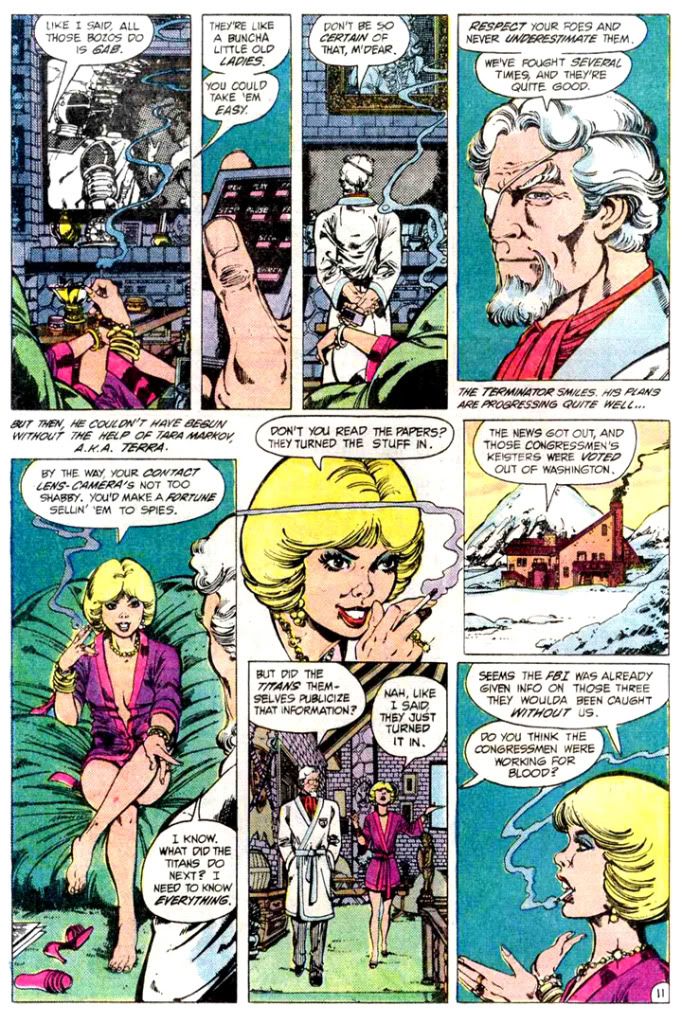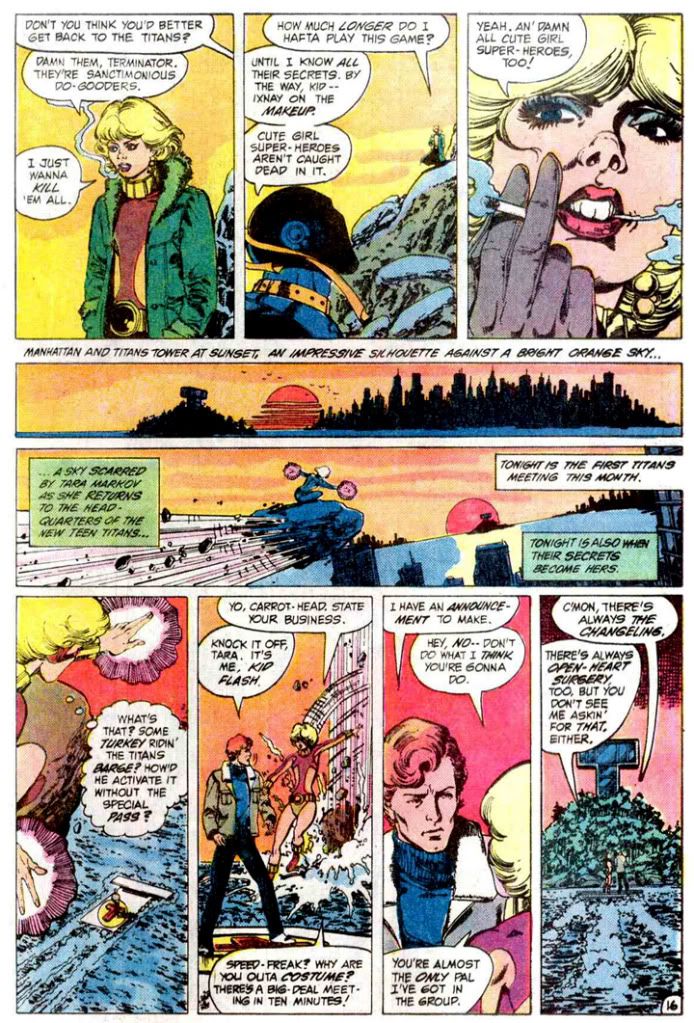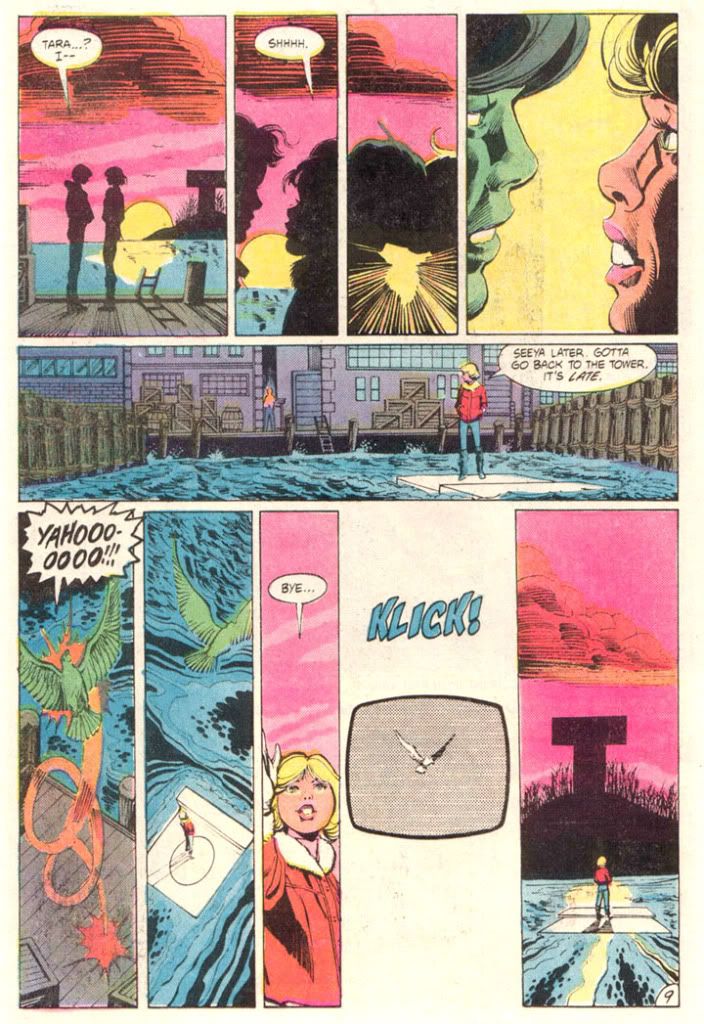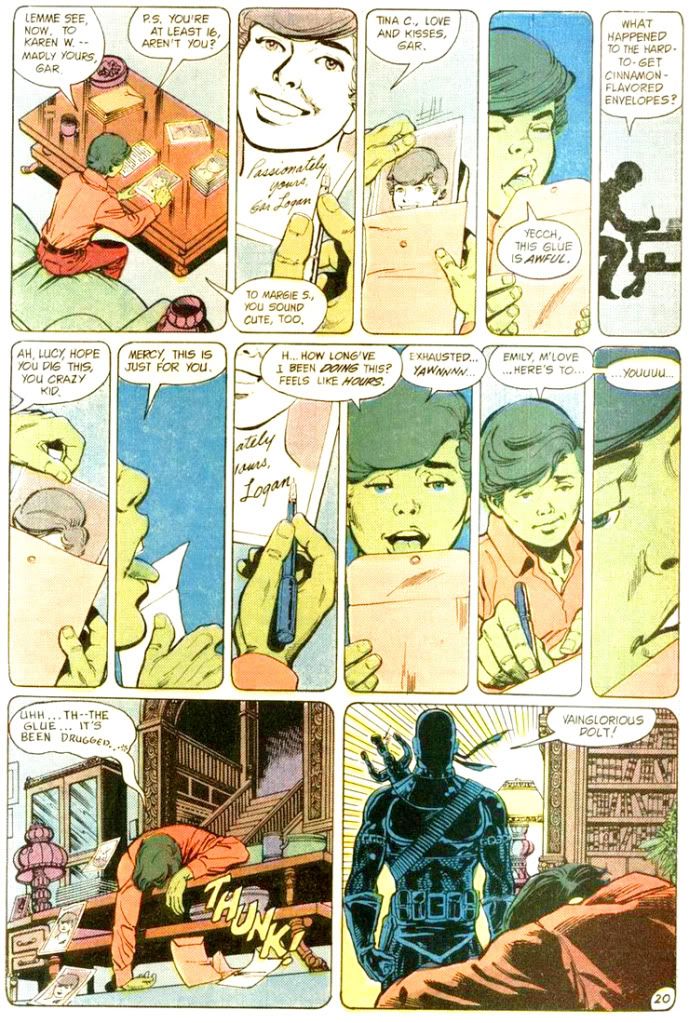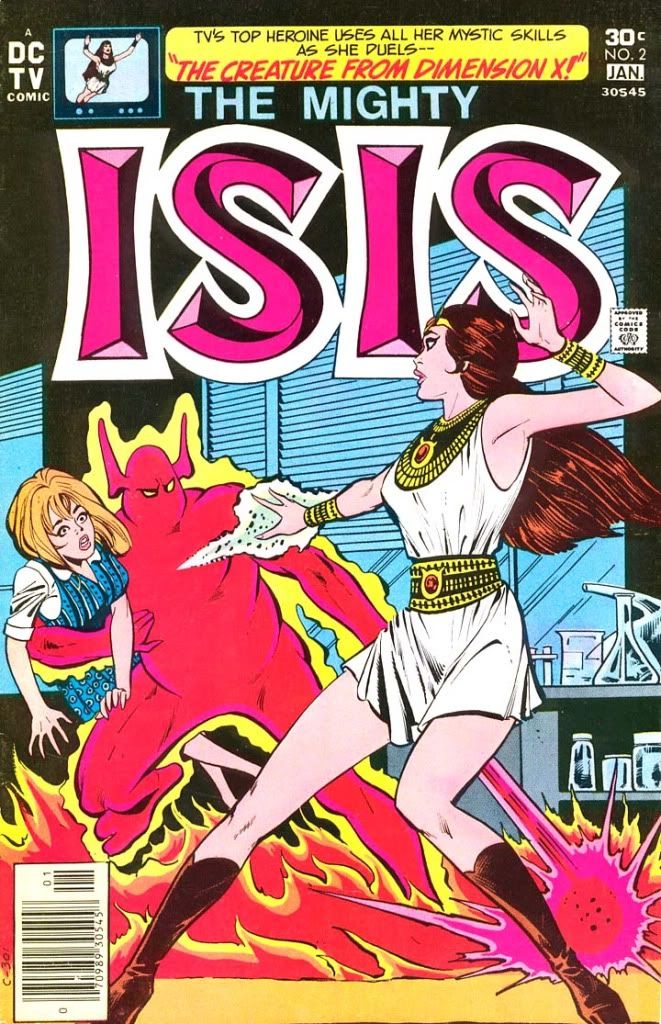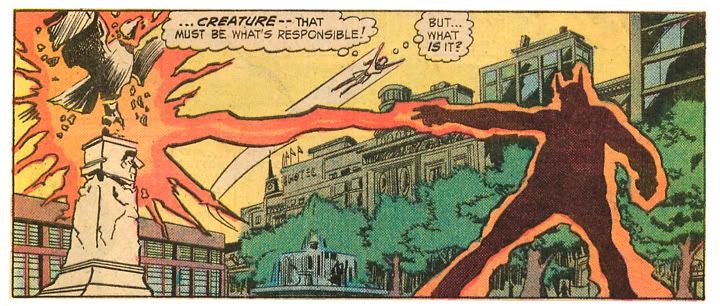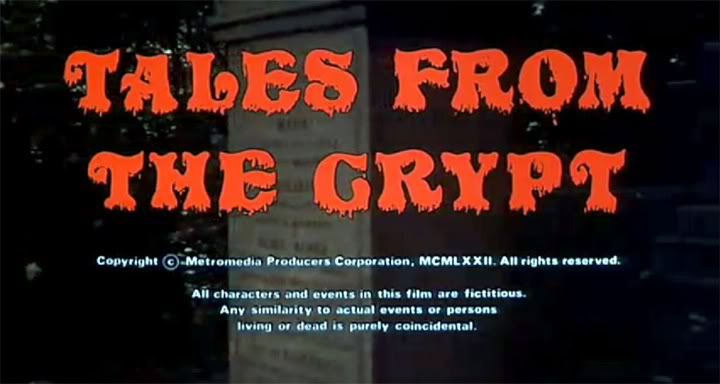Okay, it's October here in Japan, which means Halloween. I celebrate Halloween for the entire month. This means watching horror movies, reading horror novels and short story collections... and horror comics. But I also love to tie Halloween to Spookey, the all-girl punk band from right here in Hamamatsu. The problem is, there are only so many Spookey videos available online and we've already seen all of them twice. But because I love Halloween and I love Spookey, I'm going to trot the old familiars out again along with a series of horror comic-themed blog entries.
This interrupts my plan to post a link to and review of every single episode of Filmation's Isis TV show. Another problem for me, less so for the millions of people who don't care about this blog or Isis. Yesterday, I planned to post a review of the episode "Lucky," which is one of the better single episodes of any 70s kid series. It's really quite amazing.
Then a typhoon blew through and knocked out the electricity in our neighborhood, so I didn't finish editing the review. Since it deals with a theme related to Halloween, I'm going to slap it with a Spookey Month label, post it sometime this week and then take a break from Isis in favor of EC, Warren and other scary four-color delights. We'll get back on track with Isis this November.
So... barring another typhoon... bring on When Comic Books Ruled's THIRD ANNUAL OCTOBER IS SPOOKEY MONTH!
Sunday, September 30, 2012
Saturday, September 29, 2012
The Secrets of Isis Episode 5: "Rockhound's Roost"
Kevin, a surly, lazy jerk, dislikes Fabian, the geology-loving (he also loves "everything in America, especially hamburgers and baseball," so right away I'm on his side) exchange student who also happens to be the prince of an unnamed African nation. Why? No reason; Kevin hates everything, especially chores. To get out of doing some yard work, he forges his dad's name on a permission slip and joins Andrea Thomas's class on a field trip to Rockhound's Roost, the bear-infested park that's supposedly way out in the wilderness somewhere but features a busy street visible just beyond its trees. Rick Mason and Ms. Thomas have their suspicions about Kevin's motives, which prove valid when Thomas catches the kid tossing the picnic dishes into the stream instead of washing them. Things come to a head when Mr. Mason calls the school and learns of Kevin's deceit. Kevin rashly runs away, pursued by a concerned Fabian. Lurking nearby-- a hungry bear, desperate to protect its honey tree!
"Rockhound's Roost," which aired October 4, 1975, is the show's first outright dud. It's preachy and heavy-handed in ways previous episodes haven't been, and its lesson is a snoozer-- yet Kevin's dad and Fabian both manage to lay it on us, using almost the exact same phrase. Your responsibilities have a way of catching up with you. Once again Isis is on hand merely to reinforce what Kevin learns through hard-won experience. But over-emphasis on the moral isn't the fatal misstep here. Because "Roost" features as its climax the least convincing bear attack since that episode of Help!... It's the Hair Bear Bunch where they have an acid flashback to the day they mauled those cops in Haight-Ashbury back in '67. Really, a bear costume? A bear suit is the only thing more ridiculous than an ape suit, and this one is particularly bad. Always a mistake, and one from which this episode never recovers.
Thomas Carter as Fabian has a winning smile and maintains his fake accent well enough, but he's hamstrung by a lot of "In my country..." dialogue. His character is vaguely reminiscent of just about every prince or princess who ever went out among the commoners in a TV sitcom. Steven Paul as the troublesome Kevin really seems to lack conviction in the early going, which probably accounts for his character's lethargy. Playing a moody jerk is no easy task. Too far in one direction and the audience despises you and doesn't buy or care much about your eventual redemption. Too far in the other and what's the point of the story? It may be the plodding script that does him in, but it doesn't help that his performance is eerily similar to Hayden Christensen's in the Star Wars prequels. They're sound-alikes anyway, with the same flat delivery. By the time Kevin does his about-face becomes likable, we're already in bear country and he's fatally upstaged by the ridiculous bear.
Brian Cutler touched on this in his interview on the Isis DVD, but this episode is a perfect example of how the show acted as a starting point for a lot of youngsters who went on to successful careers both in front of and behind the camera. Carter acted in 37 episodes of TV's The White Shadow and later directed multiple outings of Hill Street Blues, St. Elsewhere, Amazing Stories and the critically-lauded miniseries A Year in the Life, plus theatrical features like Coach Carter and Save the Last Dance. He's a three-time Emmy winner as a director and producer and a 6-time nominee. While he was one of many producers on the Nicholas Cage Ghost Rider and its sequel, Ghost Rider: Spirit of Vengeance, Paul's major contribution to world cinema is as director of Slapstick (Of Another Kind) starring Jerry Lewis and Madeline Kahn, perhaps the single most bizarre adaptation of a Kurt Vonnegut novel we're ever likely to see.
We're not talking prestige projects here, but Paul's got some lengthy producing credits, mostly of family-oriented fare with titles like The Karate Dog. He's apparently taking the reins of the Baby Geniuses franchise-- yes, it's a franchise now, in that they're completed a new entry in the series and are hard at work on numbers four and five-- from the late Bob Clark.
According to the IMDB, Paul bought his own building in Century City and "has a full bar in his office." Okay, no joke-- I'm officially impressed.
Brian Cutler's Rick Mason becomes more and more interesting, with each episode adding little facets to his character. The premiere didn't give him much to work with, just simple declarative statements for the most part. But part of the fun of Isis is watching Cutler get into a groove as his character become the show's understated comedic relief. He never plays Mason as a clown, but he gets in a zinger or two here and there. Mason's the kind of teacher who doesn't mind farming for corn and chuckling at his own jokes. But he turns serious and capable in a crisis. Cutler may not transform into a hero, but he's obviously comfortable in the role of male Lois Lane at this point.
In fact, by now the show has developed consistent good chemistry among the lead trio. Joanna Cameron continues to rock (get it?) her dual role even when faced with the horrific Ursus arctos horribilis. You have to give her mad respect for maintaining her dignity during that sequence, which features a ring of fire that's all too obviously artificial, but proves effective at holding the slow-moving (possibly dying from some kind of ursine motor-neuron disease from the looks of it) bear at bay. Joanna Pang as Cindy Lee is a total charmer as class spokesperson. Literally. Not a single classmate besides the two guest stars has so much as a single line of dialogue, leaving Cindy to do all the heavy lifting in the background. "Don't worry, gang," Mason tells the class as he dashes off with Thomas to find that dick Kevin, "We'll get out in the field yet."
"You know what, gang?" Cindy says as soon as the teachers are out of earshot and her classmates gather around her to listen. "I am worried!"
But the most amazing thing about this episode has to be Rick Mason's kick ass rayon-- you know, art silk-- shirt, the one he wears on the field trip. What is that print? Is it simply abstract, or is it some kind of an animal/peacock feather thing? Whatever it is, it is happening. It is 70s gold! Fabian's dashikis are pretty cool, too. I've always loved dashikis. I've never worn one because I've never felt it would be culturally appropriate, but yeah.
As long as we're on this costuming kick, in her DVD interview Joanna Pang poked a little fun at Cindy Lee's light blue overalls and now I understand why. It's not that she looks bad in them; she's cute as a bug. It's that she wears them practically in every episode. They're on fine display here, both in the classroom and in the forest.
Winner of the coveted "Costume of the Episode" prize goes to the poor stuntperson in that threadbare bear suit. This is one of those times when cutting the already minuscule budget would have been a good idea. "Hey, I don't think we can afford the top quality bear suit rental, but we can get this shoddy one for less because the last person to wear it died of the bubonic plague." "Oh, that's too bad. Bears and Isis just don't mix. Let's come up with some other form of jeopardy for Kevin and Fabian... one that doesn't look quite so tacky."
Maybe they actually did try to rent a trained animal performer, but if they'd been thinking straight the producers would have realized a third act re-write was really in order. Fabian gets his ankle caught conveniently in some rocks-- ironic, eh?-- and Kevin taunts the lethargic bear with a handful of what's supposed to be honey (should have used Post Super Sugar Crisp cereal instead) from about a foot away. Ask Timothy Treadwell if that's such a good idea. Of course with this particular bear, the biggest danger is being overcome by the twin menace of mothball fumes and the unbearable odor of the sloppily sweating stuntperson inside.
For those of you in the audience who are actual rock hounds-- you do get some rock lore here, but it's not going to help you pass that geology test. Ms. Thomas fills us in on obsidian, Cindy Lee marvels at various stones, and Kevin's dad-- who earlier bonded with Fabian over the young fellow's rock collection-- teaches his son and the viewers at home the recipe for granite.
"Rockhound's Roost," which aired October 4, 1975, is the show's first outright dud. It's preachy and heavy-handed in ways previous episodes haven't been, and its lesson is a snoozer-- yet Kevin's dad and Fabian both manage to lay it on us, using almost the exact same phrase. Your responsibilities have a way of catching up with you. Once again Isis is on hand merely to reinforce what Kevin learns through hard-won experience. But over-emphasis on the moral isn't the fatal misstep here. Because "Roost" features as its climax the least convincing bear attack since that episode of Help!... It's the Hair Bear Bunch where they have an acid flashback to the day they mauled those cops in Haight-Ashbury back in '67. Really, a bear costume? A bear suit is the only thing more ridiculous than an ape suit, and this one is particularly bad. Always a mistake, and one from which this episode never recovers.
Thomas Carter as Fabian has a winning smile and maintains his fake accent well enough, but he's hamstrung by a lot of "In my country..." dialogue. His character is vaguely reminiscent of just about every prince or princess who ever went out among the commoners in a TV sitcom. Steven Paul as the troublesome Kevin really seems to lack conviction in the early going, which probably accounts for his character's lethargy. Playing a moody jerk is no easy task. Too far in one direction and the audience despises you and doesn't buy or care much about your eventual redemption. Too far in the other and what's the point of the story? It may be the plodding script that does him in, but it doesn't help that his performance is eerily similar to Hayden Christensen's in the Star Wars prequels. They're sound-alikes anyway, with the same flat delivery. By the time Kevin does his about-face becomes likable, we're already in bear country and he's fatally upstaged by the ridiculous bear.
Brian Cutler touched on this in his interview on the Isis DVD, but this episode is a perfect example of how the show acted as a starting point for a lot of youngsters who went on to successful careers both in front of and behind the camera. Carter acted in 37 episodes of TV's The White Shadow and later directed multiple outings of Hill Street Blues, St. Elsewhere, Amazing Stories and the critically-lauded miniseries A Year in the Life, plus theatrical features like Coach Carter and Save the Last Dance. He's a three-time Emmy winner as a director and producer and a 6-time nominee. While he was one of many producers on the Nicholas Cage Ghost Rider and its sequel, Ghost Rider: Spirit of Vengeance, Paul's major contribution to world cinema is as director of Slapstick (Of Another Kind) starring Jerry Lewis and Madeline Kahn, perhaps the single most bizarre adaptation of a Kurt Vonnegut novel we're ever likely to see.
We're not talking prestige projects here, but Paul's got some lengthy producing credits, mostly of family-oriented fare with titles like The Karate Dog. He's apparently taking the reins of the Baby Geniuses franchise-- yes, it's a franchise now, in that they're completed a new entry in the series and are hard at work on numbers four and five-- from the late Bob Clark.
According to the IMDB, Paul bought his own building in Century City and "has a full bar in his office." Okay, no joke-- I'm officially impressed.
Brian Cutler's Rick Mason becomes more and more interesting, with each episode adding little facets to his character. The premiere didn't give him much to work with, just simple declarative statements for the most part. But part of the fun of Isis is watching Cutler get into a groove as his character become the show's understated comedic relief. He never plays Mason as a clown, but he gets in a zinger or two here and there. Mason's the kind of teacher who doesn't mind farming for corn and chuckling at his own jokes. But he turns serious and capable in a crisis. Cutler may not transform into a hero, but he's obviously comfortable in the role of male Lois Lane at this point.
In fact, by now the show has developed consistent good chemistry among the lead trio. Joanna Cameron continues to rock (get it?) her dual role even when faced with the horrific Ursus arctos horribilis. You have to give her mad respect for maintaining her dignity during that sequence, which features a ring of fire that's all too obviously artificial, but proves effective at holding the slow-moving (possibly dying from some kind of ursine motor-neuron disease from the looks of it) bear at bay. Joanna Pang as Cindy Lee is a total charmer as class spokesperson. Literally. Not a single classmate besides the two guest stars has so much as a single line of dialogue, leaving Cindy to do all the heavy lifting in the background. "Don't worry, gang," Mason tells the class as he dashes off with Thomas to find that dick Kevin, "We'll get out in the field yet."
"You know what, gang?" Cindy says as soon as the teachers are out of earshot and her classmates gather around her to listen. "I am worried!"
But the most amazing thing about this episode has to be Rick Mason's kick ass rayon-- you know, art silk-- shirt, the one he wears on the field trip. What is that print? Is it simply abstract, or is it some kind of an animal/peacock feather thing? Whatever it is, it is happening. It is 70s gold! Fabian's dashikis are pretty cool, too. I've always loved dashikis. I've never worn one because I've never felt it would be culturally appropriate, but yeah.
As long as we're on this costuming kick, in her DVD interview Joanna Pang poked a little fun at Cindy Lee's light blue overalls and now I understand why. It's not that she looks bad in them; she's cute as a bug. It's that she wears them practically in every episode. They're on fine display here, both in the classroom and in the forest.
Winner of the coveted "Costume of the Episode" prize goes to the poor stuntperson in that threadbare bear suit. This is one of those times when cutting the already minuscule budget would have been a good idea. "Hey, I don't think we can afford the top quality bear suit rental, but we can get this shoddy one for less because the last person to wear it died of the bubonic plague." "Oh, that's too bad. Bears and Isis just don't mix. Let's come up with some other form of jeopardy for Kevin and Fabian... one that doesn't look quite so tacky."
Maybe they actually did try to rent a trained animal performer, but if they'd been thinking straight the producers would have realized a third act re-write was really in order. Fabian gets his ankle caught conveniently in some rocks-- ironic, eh?-- and Kevin taunts the lethargic bear with a handful of what's supposed to be honey (should have used Post Super Sugar Crisp cereal instead) from about a foot away. Ask Timothy Treadwell if that's such a good idea. Of course with this particular bear, the biggest danger is being overcome by the twin menace of mothball fumes and the unbearable odor of the sloppily sweating stuntperson inside.
For those of you in the audience who are actual rock hounds-- you do get some rock lore here, but it's not going to help you pass that geology test. Ms. Thomas fills us in on obsidian, Cindy Lee marvels at various stones, and Kevin's dad-- who earlier bonded with Fabian over the young fellow's rock collection-- teaches his son and the viewers at home the recipe for granite.
Friday, September 28, 2012
The Secrets of Isis Episode 2: "Spots of the Leopard"
Episode two? But we just watched episode four. Yes, this one is out of order. Wait! YOU'RE OUT OF ORDER! YOU'RE OUT OF ORDER! THE WHOLE BLOG IS OUT OF ORDER! THEY'RE OUT OF ORDER!
Ladies and gentlemen, Mr. Al Pacino. On with the review.
Can Isis help restore a girl's faith in her ex-con father when he's the main suspect in a crime spree? That's what we're here to find out as we discuss the second episode of Isis, "Spots of the Leopard," which aired September 13, 1975. Jenny Nelson and her dad Chuck have to fend for themselves because Mom's out of town. Chuck recently got out of prison and when someone starts using his M.O. (that's crime talk for modus operandi, or "how the heck it's done") to steal industrial diamonds, and his alibi proves bogus, even Jenny suspects her dad's gone back to his thieving ways. Cindy Lee tries to get her to discuss it with Ms. Thomas, who apparently has the answer to everything, at least according to Cindy.
The girl's reluctant, then her father takes her on a spur of the moment camping trip. This does nothing to soothe her, especially when she sees his wallet stuffed with money. Off to the woods again. People are always going into the woods in this show. Was Henry David Thoreau on the writing staff? Only Jenny doesn't go there because she wants to live deliberately; twitchy because he's under scrutiny from the insurance investigator who sent him to the big house once before, her father gives her little choice, and she's not happy about it or him. To make matters worse, she gets her foot caught under a fake log which conveniently rolls down a hill onto her ankle just when Isis flies in to talk to her.
Jenny is played by Debralee Scott, who was the 1970s version of the great Clea DuVall. Like DuVall, Scott was one of those everywhere faces in the 70s and 80s, one of those actors you sort of recognize because they turn up when you least expect them and always seem to do solid work. She seemed to specialize in baby sisters, though. Scott played Louise Lasser's little sister on Mary Hartman, Mary Hartman (was there some kind of special casting relationship between that show and Isis, or were the Hartman actors simply up for every part in town at one point?), Rosalie "Hotsy" Totsy in a few episodes of Welcome Back, Kotter, then another younger sister to Donna Pescow on Angie. After with Kotter, I probably remember her most from Angie, having been a major fan of that show as a kid for reasons my adult self cannot fathom. She even had parts in a couple of those Police Academy movies. Her own older sister produced for Robert Altman, by the way.
Sadly, while doing some background research on this episode, I discovered Scott passed away in 2005, followed shortly by her sister. It's a strange story and upsets me to no end.
You won't get any complaints about Scott's performance here, even if she has to act opposite a papier-mache log, which weighs a couple of pounds at least, and pretend it has her foot pinned. That set up is pretty contrived and silly, but the rest of the show is fairly solid. I love the casual opening scene where Jenny teases her dad about buying too much at the supermarket. Veteran character actor Lou Frizzell looks nothing like Scott (maybe she's adopted?) but because they're consummate pros, they create a believable father-daughter chemistry. Due to the plot machinations that require him to be shifty and suspicious when being forthright would have solved his problems within the first five minutes, father Chuck comes across as a bit of a bonehead, though.
Thanks to Roger Ebert's Law of the Conservation of Characters the true culprit fools no one. Even Chuck figures him out, but then he stupidly takes things a step too far when he rashly attempts to crimebust on his own and nearly pays for it with both his freedom and his daughter's respect. Which is the real crook's plan all along. Pin it on the obvious guy, then... Well, after that it's not exactly clear how he plans to make himself wealthy with the diamonds, which will still have to be accounted for.
One thing you'll notice about Isis is the stories aren't really about Isis, or Rick Mason, and only rarely about Cindy Lee. They're about the guest stars. It's a formula pioneered by shows like Bonanza and The Fugitive. The lead characters remain in stasis because they have to maintain the show's premise week after week. And since all fiction involves conflict and change-- I mean character growth, not Ms. Thomas into Isis-- all the lessons have to be learned by various students and/or their families and we never see them again. Ms. Thomas remains cool and collected, Rick Mason jovially dedicated and Cindy Lee enthusiastic about her studies and pro-Andrea Thomas. Like the Cartwrights, they are transformative agents, popping into the story here and there to help things along. Any personal growth they experience happens long term and off-screen. But essentially, not at all.
But I'm troubled. There's a little matter that really bothers me. Chuck Nelson grills up some burgers for the gang, then goes off to confront the burglar. In the meantime, there's a police stake out and people driving (or flying on zephyr winds) from location to location. This is before anyone actually attempts to eat a burger. So my question is, how long were those hamburgers lying around in the sun?
And yet they must be safe to eat because Ms. Thomas and Mr. Mason would never-- Oh, that's right! Cindy, Jenny and Chuck settle in to eat, but the two teachers order theirs to go. Probably to dump the contaminated meat patties in a wastebasket somewhere. Their excuse is they have to paint Thomas's apartment. Now there may or may not have been a little romance between them, or perhaps they maintained their professional relationship all along. But asking someone to help paint your apartment is a pretty big step in a relationship of any kind.
Because I've been trained to by so many subsequent TV shows, I keep looking for signs of sexual tension or flirtation between Thomas and Mason, but these fine teachers remain merely colleagues no matter how much time they spend together investigating UFOs, looking for Cindy Lee or discussing crime waves. The DC comic tries desperately to pair them up, but in this day of "shippers" and fan fiction pairings of every imaginable combination, it's kind of refreshing to think both Ms. Thomas and Mr. Mason date outside the show's onscreen cast in between episodes and just keep their private lives largely to themselves when they're on the job, or the case. Every male-female duo doesn't have to be David and Maddy or Lois and Clark or Mulder and Scully or Booth and Bones, for Isis's sake.
Let's all give Cindy a hand for being nonjudgemental. You can imagine the pressures faced by a teen who has to show up every day when everyone knows her father's a jailbird. Kids can be cruel about things so seemingly inconsequential as a pimple or pooping your pants on a long bus ride during a field trip because you're too embarrassed to tell a teacher you're in gastric distress, so you can imagine how having a prison parent affects Jenny's social life. And yet there's the popular and peppy Cindy Lee making it a point to sit with Jenny at lunch. A true friend!
Ladies and gentlemen, Mr. Al Pacino. On with the review.
Can Isis help restore a girl's faith in her ex-con father when he's the main suspect in a crime spree? That's what we're here to find out as we discuss the second episode of Isis, "Spots of the Leopard," which aired September 13, 1975. Jenny Nelson and her dad Chuck have to fend for themselves because Mom's out of town. Chuck recently got out of prison and when someone starts using his M.O. (that's crime talk for modus operandi, or "how the heck it's done") to steal industrial diamonds, and his alibi proves bogus, even Jenny suspects her dad's gone back to his thieving ways. Cindy Lee tries to get her to discuss it with Ms. Thomas, who apparently has the answer to everything, at least according to Cindy.
The girl's reluctant, then her father takes her on a spur of the moment camping trip. This does nothing to soothe her, especially when she sees his wallet stuffed with money. Off to the woods again. People are always going into the woods in this show. Was Henry David Thoreau on the writing staff? Only Jenny doesn't go there because she wants to live deliberately; twitchy because he's under scrutiny from the insurance investigator who sent him to the big house once before, her father gives her little choice, and she's not happy about it or him. To make matters worse, she gets her foot caught under a fake log which conveniently rolls down a hill onto her ankle just when Isis flies in to talk to her.
Jenny is played by Debralee Scott, who was the 1970s version of the great Clea DuVall. Like DuVall, Scott was one of those everywhere faces in the 70s and 80s, one of those actors you sort of recognize because they turn up when you least expect them and always seem to do solid work. She seemed to specialize in baby sisters, though. Scott played Louise Lasser's little sister on Mary Hartman, Mary Hartman (was there some kind of special casting relationship between that show and Isis, or were the Hartman actors simply up for every part in town at one point?), Rosalie "Hotsy" Totsy in a few episodes of Welcome Back, Kotter, then another younger sister to Donna Pescow on Angie. After with Kotter, I probably remember her most from Angie, having been a major fan of that show as a kid for reasons my adult self cannot fathom. She even had parts in a couple of those Police Academy movies. Her own older sister produced for Robert Altman, by the way.
Sadly, while doing some background research on this episode, I discovered Scott passed away in 2005, followed shortly by her sister. It's a strange story and upsets me to no end.
You won't get any complaints about Scott's performance here, even if she has to act opposite a papier-mache log, which weighs a couple of pounds at least, and pretend it has her foot pinned. That set up is pretty contrived and silly, but the rest of the show is fairly solid. I love the casual opening scene where Jenny teases her dad about buying too much at the supermarket. Veteran character actor Lou Frizzell looks nothing like Scott (maybe she's adopted?) but because they're consummate pros, they create a believable father-daughter chemistry. Due to the plot machinations that require him to be shifty and suspicious when being forthright would have solved his problems within the first five minutes, father Chuck comes across as a bit of a bonehead, though.
Thanks to Roger Ebert's Law of the Conservation of Characters the true culprit fools no one. Even Chuck figures him out, but then he stupidly takes things a step too far when he rashly attempts to crimebust on his own and nearly pays for it with both his freedom and his daughter's respect. Which is the real crook's plan all along. Pin it on the obvious guy, then... Well, after that it's not exactly clear how he plans to make himself wealthy with the diamonds, which will still have to be accounted for.
One thing you'll notice about Isis is the stories aren't really about Isis, or Rick Mason, and only rarely about Cindy Lee. They're about the guest stars. It's a formula pioneered by shows like Bonanza and The Fugitive. The lead characters remain in stasis because they have to maintain the show's premise week after week. And since all fiction involves conflict and change-- I mean character growth, not Ms. Thomas into Isis-- all the lessons have to be learned by various students and/or their families and we never see them again. Ms. Thomas remains cool and collected, Rick Mason jovially dedicated and Cindy Lee enthusiastic about her studies and pro-Andrea Thomas. Like the Cartwrights, they are transformative agents, popping into the story here and there to help things along. Any personal growth they experience happens long term and off-screen. But essentially, not at all.
But I'm troubled. There's a little matter that really bothers me. Chuck Nelson grills up some burgers for the gang, then goes off to confront the burglar. In the meantime, there's a police stake out and people driving (or flying on zephyr winds) from location to location. This is before anyone actually attempts to eat a burger. So my question is, how long were those hamburgers lying around in the sun?
And yet they must be safe to eat because Ms. Thomas and Mr. Mason would never-- Oh, that's right! Cindy, Jenny and Chuck settle in to eat, but the two teachers order theirs to go. Probably to dump the contaminated meat patties in a wastebasket somewhere. Their excuse is they have to paint Thomas's apartment. Now there may or may not have been a little romance between them, or perhaps they maintained their professional relationship all along. But asking someone to help paint your apartment is a pretty big step in a relationship of any kind.
Because I've been trained to by so many subsequent TV shows, I keep looking for signs of sexual tension or flirtation between Thomas and Mason, but these fine teachers remain merely colleagues no matter how much time they spend together investigating UFOs, looking for Cindy Lee or discussing crime waves. The DC comic tries desperately to pair them up, but in this day of "shippers" and fan fiction pairings of every imaginable combination, it's kind of refreshing to think both Ms. Thomas and Mr. Mason date outside the show's onscreen cast in between episodes and just keep their private lives largely to themselves when they're on the job, or the case. Every male-female duo doesn't have to be David and Maddy or Lois and Clark or Mulder and Scully or Booth and Bones, for Isis's sake.
Let's all give Cindy a hand for being nonjudgemental. You can imagine the pressures faced by a teen who has to show up every day when everyone knows her father's a jailbird. Kids can be cruel about things so seemingly inconsequential as a pimple or pooping your pants on a long bus ride during a field trip because you're too embarrassed to tell a teacher you're in gastric distress, so you can imagine how having a prison parent affects Jenny's social life. And yet there's the popular and peppy Cindy Lee making it a point to sit with Jenny at lunch. A true friend!
Wednesday, September 26, 2012
The Real Super Power Couple: Changeling and Terra
Okay, let's take a break from the wholesome goodness of Cindy Lee Crunch-- the new cereal from Post that's part of your complete breakfast-- for a walk on the wild side.
A few weeks ago, in another example of that company's typical deft touch with public relations, the DC Comics website posted an adorable list of their top 10 "Super Power Couples." As you can see from the comments attached to it comic fans are in nearly complete agreement with the choice for top couple. Celebrating love and all that. It's what we do best online. Unfortunately, what everyone seems to be overlooking in their rush to praise is this list is flawed. There's a serious omission that calls into question its integrity as an objective document. Tim Beedle, the lucky cat who compiled it, left out the most important DC love match of them all: Changeling and Tara "Terra" Markov.
The young ones. Darling, they're the young ones. And the young ones shouldn't be afraid to live, love while the flame is strong. For he's a chronic sexual harasser and she's a manipulative psychopath. They're not Joanie Cunningham and Chachi Arcola, that's for sure. More like Benny Hill meets Lynette "Squeaky" Fromme. Yet all the world loves a lover, or so I'm told by songs and drunks. So in that spirit, let's take a look back at romance. Let's take a look back at love. Let's take a look back at a relationship so perverse Caligula himself looked up from the bowels of Hell and barfed on his toga.
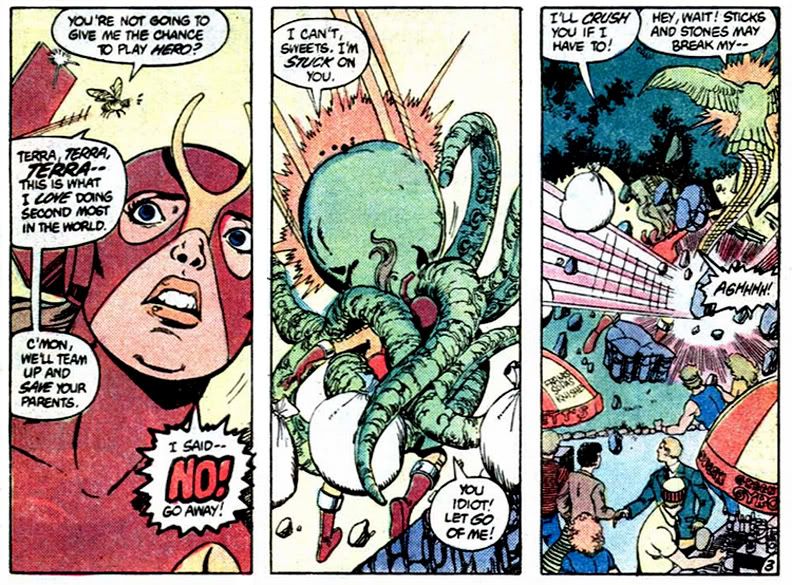 |
| Setting the tone for their relationship earl |
We find out in Teen Titans #27 (February 1983) Changeling's actually been stalking Terra for several days. And it's in this issue when unable to contain his animal lusts (literal), he transforms into an octopus and wraps his loving tentacles around her, despite Terra's very loud verbal protests. This sets the pattern for their interactions for the rest of her very short, very violent life.
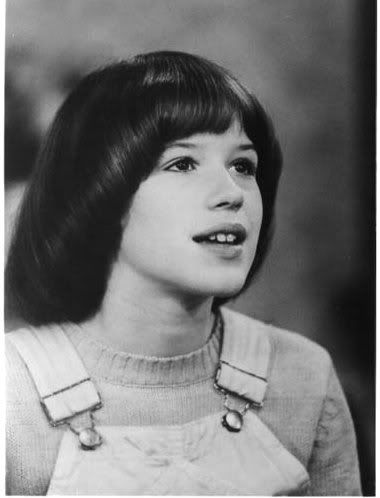 |
| Molly Ringwald forever! If your store don't got Molly Ringwald, then your store could use some fixin'! |
Comic books love to deal in simplistic moral dichotomies, good versus evil. In real life, it's rarely that simple. Of course we can use "evil" as a catch-all explanation for malevolent actions, but in some cases these are undertaken by people with with what they consider good intentions. Terra, on the other hand, has nothing but the worst intentions. She's cunning, manipulative, lies, demonstrates few signs of empathy or remorse and blames others for her shortcomings. Then there are the infrequent murderous rages. She's a much more satisfying character if she's allowed simply to be a psychopath from the get-go because it's so diametrically opposed to her looks and comic book archetype-- which, as we'll see, she'll later badmouth in a moment that exists as a satirical comment on all the Kitty Prydes and Jubilees and kid sister tag-alongs so popular in American comics. Some people are seriously bent for reasons we just cannot fathom, and they sometimes come in the guise of people we love. That's Terra all over.
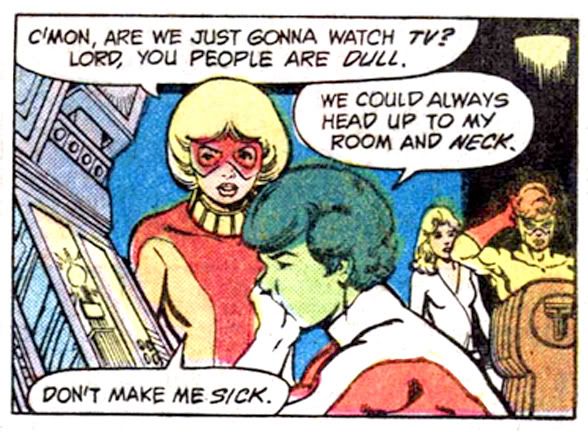 |
| Changeling tries his subtle approach for once. |
Even though they have a long and honored tradition of bone-headedness, the Titans don't immediately let Terra in on all their secrets. She's unwilling to share much about herself, and as a result, it takes a while for the group to accept her fully. And she complains about this. A lot. In Teen Titans #34 (September 1983), she and the Deathstroke stage a fake fight to speed up the trust-building process. At the end of the issue, Terra and Deathstroke join to gloat their impending success and Terra's whining and moping prove to be merely the theatrics of a consummate grifter. Kid's got acting chops at 16 that would put Jodie Foster's to shame.
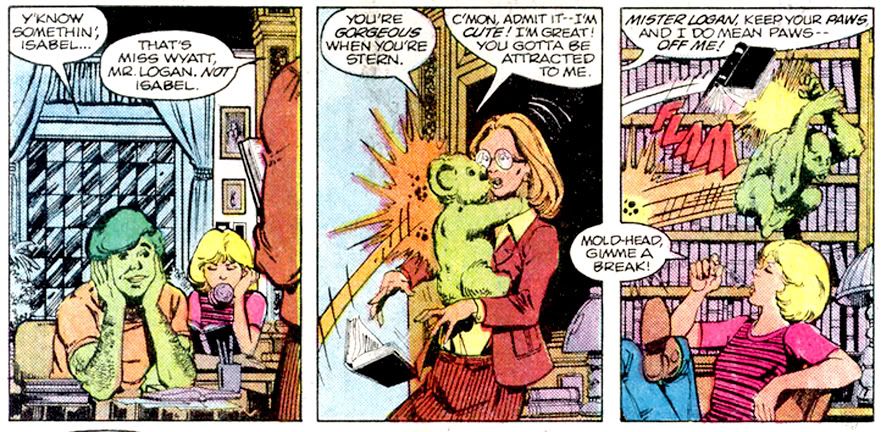 |
| I forget when this happens. Yes, even his teacher. |
Okay, the smoking part is true, not sure about the Captain Kangaroo thing. Deathstroke is a major Statler Brothers fan, though. It's true. I can't remember which comic I read that in, but I'm sure I did. Now maybe I'm wrong about the two of them sleeping together, but from her attire-- a brief silk robe that she casually allows to flap open-- I feel justified in making that assumption. They're obviously quite comfortable with her near-nudity, and there's a shivery little moment where Terra picks up a photo of Deathstroke's family and asks, "Hey, Honey... who are these people in the pic with you?"
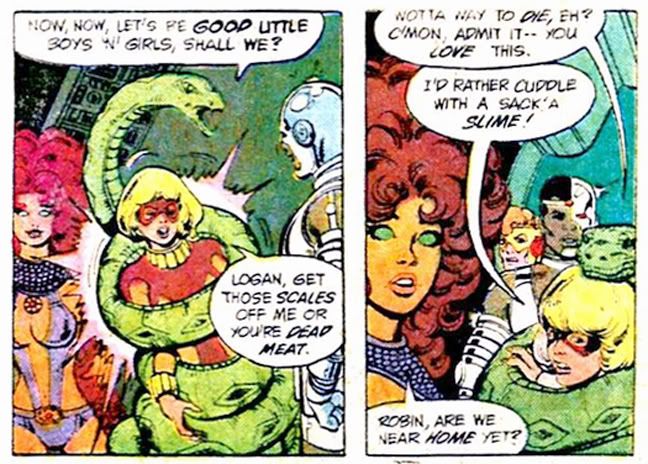 |
| They just allow this. |
But what about poor little Changeling? With almost constant access to Terra, there's practically nothing she can say that he won't turn into innuendo or sexual invitation. And when he's not hitting on her, he's consistently harassing his other female teammates, usually right in front of Terra.
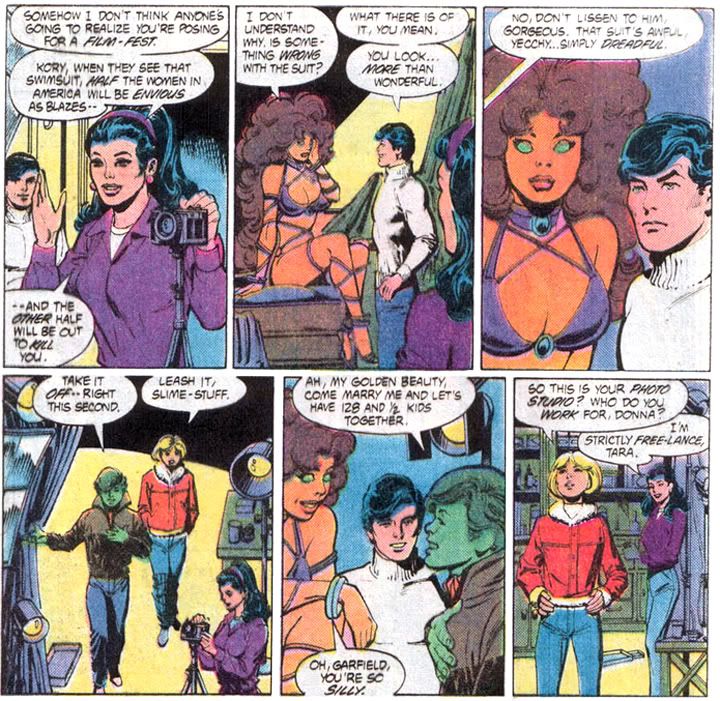 |
| Classy. |
Starfire's just finished a photoshoot at Donna Troy's photography studio when Changeling barges in, demands she strip naked in front of him, then asks to marry her because he wants to have 128 and a half kids with her. You know, "Let's screw each other over one hundred times." Although if you think about it just a teensy bit, he's a green shape-shifting mutant and she's an alien of unknown biological function; perhaps they could achieve that litter in a single attempt. But what makes this Changeling moment so magically sweet is how he says this not only in front of Terra, but also Starfire's boyfriend, Robin.
This is also the same issue Terra finally gives in and kisses Changeling. It's an ambiguous moment because we can't be sure if he's finally melted her heart or if she's just doing this to make it that much sweeter when she finally cuts his out and shows it to him before eating it. Perhaps even Terra herself doesn't know. But considering where Changeling's mouth has no doubt been, it's probably the bravest thing this poor sick girl has ever done.
This moment will come back to haunt us later. Kiss aside, Changeling's preferred method for interacting with women is simply transforming into various animals then just copping a feel. Why ask permission? Just jump right on, kid! Telling your victims how much they're secretly enjoying it makes these moments all the more delightful for everyone involved. The phallic snake is his favorite guise. He uses this form twice against Terra (that we're shown), but it's the second time-- post-kiss, when he's completely convinced they're a couple, no less-- that finally makes Terra snap. It's amusing, really, to think the one thing that could un-do a scheme that's turned and twisted for so many issues would be Changeling's grabby ways, but the surprising thing is no one's tried to kill him before. This time Terra can't help herself. Even Changeling admits he might have carried things a bit too far.
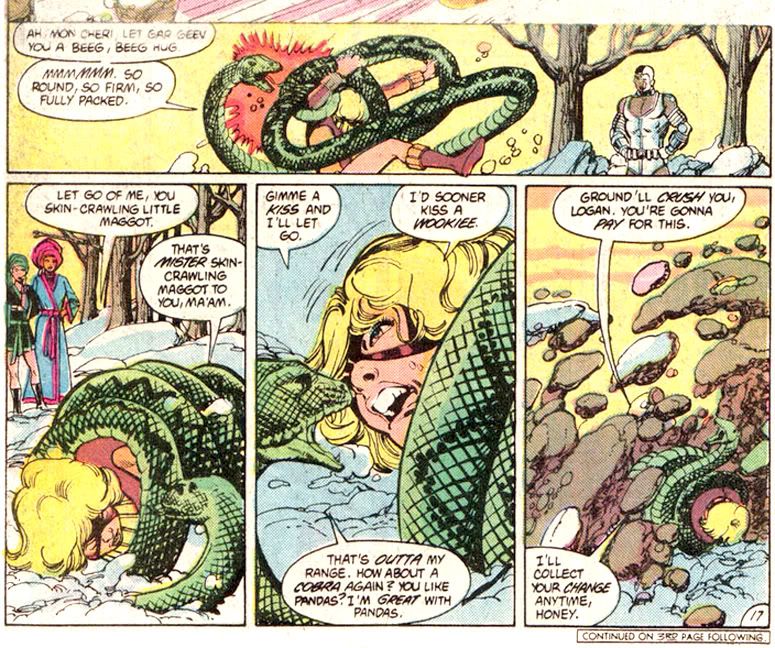 |
| Does she look as though she's enjoying this? |
As if to prove the Titans to a member are only slightly smarter than Gomer Pyle, they still have no idea what's happening-- oh, Raven occasionally stared a little and talked about evil vibes, but did absolutely nothing to prevent the onrushing tragedy that comes to her as a complete surprise even after Terra attempts to kill Changeling after he humiliates her in the snow-- until Deathstroke himself shows up and takes down almost the entire team in Tales of the New Teen Titans #43 (June 1984). Dick Grayson, having dumped his Robin identity, narrowly escapes, but can't figure out how Deathstroke could have learned all the Titans' secrets. No, it couldn't have been that furtive, unpleasant girl they didn't know all that well, the one they invited into the group and kept angrily demanding to know their real names and addresses until they finally caved, just a day or two before Deathstroke's attack, which must have been a complete coincidence. Grayson's so thick, Deathstroke's supposedly deceased wife has to show up and laboriously spell it all out to the former kid detective. Trained by the Batman, he was. World's greatest detective. For pacing's sake, Wolfman and Perez edited out the already-drawn three page sequence where she acts it out for ex-Robin's benefit using hand puppets.
The rest of the Titans-- no brain trust-- still can't understand what's happening to them. Everyone seems convinced Deathstroke recruited Terra and somehow mind-controlled her, but he's like, "Whoa, hold on, folks, she's the one who came to me with this whole crazy idea." Changeling's so caught up in his fairy tale-slash-porn video romance Terra has to literally tell him to his face-- he's an elephant at the time-- she hates his guts and has always hated his guts. She then tries kill him for the second time before he comes to understand she might be somewhat less than in love with him. And even then you get the sense if she just backs off a little on the violence and mayhem, he's just going to morph into a bunny and trying to tickle her nose with his powder-puff tail.
The Titans are such dopes after Terra finally destroys herself in a rage focused solely on them, they dip into their team activity funds and build a monument to her, topped with a marble bust of her Ringwaldian countenance. Her bust has a kind of stunned look to it, as if even she can't believe what a group of idiots they are. Changeling becomes moody and violent and takes to brooding over-- and given his inclinations, no doubt doing other things with his hands, lotion and tissues-- a gigantic photographic portrait of Terra, then grousing at his friends. Which is an improvement over trying to screw them, I suppose, but is no more endearing. Apparently, you can have either randy, inappropriate Changeling or morose, accusatory, masturbatory Changeling, but nothing in between. It would be emotionally affecting if Changeling had at any point in this story been remotely sympathetic. Or simply less dripping with slime.
The rest of the Titans-- no brain trust-- still can't understand what's happening to them. Everyone seems convinced Deathstroke recruited Terra and somehow mind-controlled her, but he's like, "Whoa, hold on, folks, she's the one who came to me with this whole crazy idea." Changeling's so caught up in his fairy tale-slash-porn video romance Terra has to literally tell him to his face-- he's an elephant at the time-- she hates his guts and has always hated his guts. She then tries kill him for the second time before he comes to understand she might be somewhat less than in love with him. And even then you get the sense if she just backs off a little on the violence and mayhem, he's just going to morph into a bunny and trying to tickle her nose with his powder-puff tail.
The Titans are such dopes after Terra finally destroys herself in a rage focused solely on them, they dip into their team activity funds and build a monument to her, topped with a marble bust of her Ringwaldian countenance. Her bust has a kind of stunned look to it, as if even she can't believe what a group of idiots they are. Changeling becomes moody and violent and takes to brooding over-- and given his inclinations, no doubt doing other things with his hands, lotion and tissues-- a gigantic photographic portrait of Terra, then grousing at his friends. Which is an improvement over trying to screw them, I suppose, but is no more endearing. Apparently, you can have either randy, inappropriate Changeling or morose, accusatory, masturbatory Changeling, but nothing in between. It would be emotionally affecting if Changeling had at any point in this story been remotely sympathetic. Or simply less dripping with slime.
Terra and Changeling. Star-crossed lovers or a psycho and a sicko? I suppose it depends on whether or not you're a romantic at heart. But they definitely deserve to be on DC's list.
Tuesday, September 25, 2012
The Secrets of Isis Episode 4: "The Sound of Silence"
Andrea Thomas proves herself an absolute genius when
she invents a uranium pellet-powered force field device she calls the “Circle Guard.” Both Rick Mason and Cindy Lee refuse to throw
a baseball at Thomas to demonstrate—Mr. Mason kids his insurance doesn't cover "beaning teachers who think they're invulnerable," while Cindy jokes, “Not me! I don’t have enough friends
as it is!”
It’s no problem for the school’s other genius, Bill, played by actor-artist Leigh McCloskey. Old timers like Bill Haverchuck and I remember him as Lucy Ewing's husband on Dallas; dude has an incredible voice, by the way (I'm jealous because I sound like Wallace Shawn on helium). McCloskey is handsome, with a patrician air about him that reminds me quite a lot of Armie Hammer's dual role as the Winklevoss Twins in The Social Network. Maybe because I think he looks like Armie Hammer. That McCloskey gives such a polished performance is a plus because he's onscreen more than the series regulars, apart from Cameron.
Bill helps Ms. Thomas with her baseball demonstration, astounding everyone in the room. Brilliant student that he is, he quickly grasps the scientific principals involved and wonders out loud (mistake) if “the other side” might pay a pretty penny for it. Later, in private with Ms. Thomas, Bill reveals his anger at having not only lost a science contest but also at having made a fool of himself by bragging to his classmates about the car he planned to buy with the cash prize. See? I'm not crazy to make this Social Network association. It turns out Bill even has the movie Winklevoss's sense of outraged white guy entitlement, if not their wealth.
When the Circle Guard vanishes, Bill is the prime suspect. The only suspect. And yeah, he’s the thief. His brilliant plan is to sell the Circle Guard to Jack Evans, boss of an organized crime gang of one or as many as two members. But he must be a bad, bad man because the very name of Jack Evans strikes fear in the hearts of our three Larkspur High crime-busters.
All poor Bill wants to do is make a quick score and buy a sharp car to impress his friends so he can once again feel like a BMOC. But the conniving Evans (veteran character actor Philip Bruns-- later of Mary Hartman, Mary Hartman and many others-- plays Evans with a touch of comic menace without ham-fisting it) has other plans. Meanwhile, Ms. Thomas realizes the Circle Guard’s uranium fuel leaks radioactivity whenever someone activates the device. Can Isis save Bill from himself, and the deadly effects of radiation?
The idea a high school teacher, even one as talented and dedicated as Andrea Thomas, could create a force field device-- much less power it with uranium pellets-- is ridiculous, of course. If Andrea Thomas really does have the know-how to produce a hand-held force field generator, she’s wasting her time teaching chemistry at Larkspur High School. She needs to be at Fermilab or the Jet Propulsion Laboratory. There’s a Nobel in her future!
But we have to overlook that because the Circle Guard is merely a macguffin that gets us to the crux of the episode-- Bill's choice between right and wrong. Wrong offers immediate rewards, right offers immediate punishment. All Bill has to do is activate the force field that will prevent the goddess from capturing the two criminals and he can have a different car for every day of the week. Isis boldly encourages Bill to make up his own mind. No threats, no violence. Just that goddess-like poise as she saunters into the forest clearing. "It's a big decision, isn't it, Bill? Maybe you ought to think about it for a moment before you make it. Because once you do," Isis tells him, "there's no turning back."
It’s no problem for the school’s other genius, Bill, played by actor-artist Leigh McCloskey. Old timers like Bill Haverchuck and I remember him as Lucy Ewing's husband on Dallas; dude has an incredible voice, by the way (I'm jealous because I sound like Wallace Shawn on helium). McCloskey is handsome, with a patrician air about him that reminds me quite a lot of Armie Hammer's dual role as the Winklevoss Twins in The Social Network. Maybe because I think he looks like Armie Hammer. That McCloskey gives such a polished performance is a plus because he's onscreen more than the series regulars, apart from Cameron.
Bill helps Ms. Thomas with her baseball demonstration, astounding everyone in the room. Brilliant student that he is, he quickly grasps the scientific principals involved and wonders out loud (mistake) if “the other side” might pay a pretty penny for it. Later, in private with Ms. Thomas, Bill reveals his anger at having not only lost a science contest but also at having made a fool of himself by bragging to his classmates about the car he planned to buy with the cash prize. See? I'm not crazy to make this Social Network association. It turns out Bill even has the movie Winklevoss's sense of outraged white guy entitlement, if not their wealth.
When the Circle Guard vanishes, Bill is the prime suspect. The only suspect. And yeah, he’s the thief. His brilliant plan is to sell the Circle Guard to Jack Evans, boss of an organized crime gang of one or as many as two members. But he must be a bad, bad man because the very name of Jack Evans strikes fear in the hearts of our three Larkspur High crime-busters.
All poor Bill wants to do is make a quick score and buy a sharp car to impress his friends so he can once again feel like a BMOC. But the conniving Evans (veteran character actor Philip Bruns-- later of Mary Hartman, Mary Hartman and many others-- plays Evans with a touch of comic menace without ham-fisting it) has other plans. Meanwhile, Ms. Thomas realizes the Circle Guard’s uranium fuel leaks radioactivity whenever someone activates the device. Can Isis save Bill from himself, and the deadly effects of radiation?
"The Sound of Silence" (the title seems to be a non sequitor; silence plays no role in the plot, nor does sound in any unusual way) is more exciting than the three previous episodes
put together (See? You guys really
needed to open “Fool’s Dare” with that bike race!), with a crime lord, action, comedic relief plus a smidgen of something resembling science. Or, as Rick Mason would have it, science fiction. Nothing beats watching Joanna Pang and Brian
Cutler do the infamous mime bit, “The Invisible Box” while pretending to press
against the Circle Guard’s force field.
The baseball richocet effect is surprisingly violent and convincing,
though. Later, Jocko, Evans’s lunkheaded
hulk of a bodyguard (he loves comic books so he can’t be all bad) injures his
shoulder trying to smash through the force field as Bill demonstrates it for
the criminal duo.
The idea a high school teacher, even one as talented and dedicated as Andrea Thomas, could create a force field device-- much less power it with uranium pellets-- is ridiculous, of course. If Andrea Thomas really does have the know-how to produce a hand-held force field generator, she’s wasting her time teaching chemistry at Larkspur High School. She needs to be at Fermilab or the Jet Propulsion Laboratory. There’s a Nobel in her future!
But we have to overlook that because the Circle Guard is merely a macguffin that gets us to the crux of the episode-- Bill's choice between right and wrong. Wrong offers immediate rewards, right offers immediate punishment. All Bill has to do is activate the force field that will prevent the goddess from capturing the two criminals and he can have a different car for every day of the week. Isis boldly encourages Bill to make up his own mind. No threats, no violence. Just that goddess-like poise as she saunters into the forest clearing. "It's a big decision, isn't it, Bill? Maybe you ought to think about it for a moment before you make it. Because once you do," Isis tells him, "there's no turning back."
Decent people like Bill sometimes make stupid, rash mistakes from momentary weakness or anger, but these don't have to define them for a lifetime. And unlike, say, Batman's violent and arrogant presumption he has to beat everyone into correctness-- granted, it's in the face of an aggressively cynical strawman argument that the world is lousy enough to require him-- it's not Isis's job to take away from people the ability to make these choices. Instead, she gently nudges them, then steps aside. The show wraps these moments in the trappings of superheroics and magic, but the real secret of Isis is the show isn't really about Isis. It's only occasionally about Cindy Lee. It's really about the Bills of the world, the true heroes of their own lives if they wish to be.
A clever touch comes when the show re-works the denouement of
the famous “Do you feel lucky punk?” scene from Dirty Harry into a nicey-nice kid-vid moment. Curious to the last, Bill asks Isis if the force field really did
stop her and could he have escaped by pressing the button, just like the bank
robber “gots to know” if Harry Callahan has fired his last bullet or not. And Isis, with a knowing smile, obliges him.
The uranium leak proves to be something of
a red herring. It’s referenced exactly
once during the climactic chase and in the end, turns out not to have had an
effect on anything other than Rick Mason’s photo negatives. Despite Ms. Thomas’s—and Isis’s—apparent health
and public safety concerns, Bill uses the Circle Guard approximately a million
times without any ill effects. Other
than falling and breaking his ankle while trying to escape through some woods
with Evans and Jocko.
Speaking of Jocko (Wayne Storm), the guy is
hilarious. He won’t stop calling Evans “Boss,”
despite being asked and while holding Ms. Thomas captive—in a child-safe sort of
way; even without her ample resources (and Tut's interference) she’s never in any danger—he gruffly offers her a “funny book” to
read. That’s probably his way of playing
nice.
As for the Circle Guard itself? Well, it’s
just a metal box. It looks like some
kind of off-the-shelf electronic equipment you’d find at a Radio Shack and
features some dials and switches, plus what looks like a telescoping radio antenna on the side for some reason. But my favorite feature is one of those analog rolling odometers
like on your grandparents’ 1973 Caprice Classic. What the heck do those numbers mean? Objects repelled? Kids helped to catharsis by Isis? Number of times Cindy Lee has risked death?
Monday, September 24, 2012
The Secrets of Isis episode 1: "The Lights of Mystery Mountain"
Sorry! I accidentally hit the wrong button and released my review of episode three, "Fool's Dare" into the wild before I gave it a thorough fact-checking. Certain online info led me to believe it was the second episode, and I needed to fill in some names. So now everything is pretty well bolixed up. No matter. Isis would have some comforting words about doing your best but understanding your limitations.
This is the premiere episode of the Filmation live action TV series Isis, or The Secrets of Isis. It aired Saturday morning, September 6, 1975 on the CBS Television Network. I was largely an ABC-NBC sort of kid, but I usually flipped over to watch this and Shazam! Unfortunately, I retained very little of my impressions of either show. Re-watching Isis now is revelatory. So I'm going to review them all right here in this very blog, and you can watch with me and see what I get wrong. Let's begin.
When high school student Cindy Lee takes photos of strange lights in the sky, teachers Andrea Thomas and Rick Mason accompany her back to a small mountain town where they investigate burned spots, abandoned cars and possibly missing tourists. When Cindy involves herself with a couple of local teens and their shady boss, can Isis save her and solve the mystery?
I don't know about you, but the first ten minutes or so probably scared me out of my pajamas when I was 7 years old. At one point our intrepid academics see the strange lights and Cindy runs back to the car alone to retrieve her camera. Yikes! Then again, I was the kind of kid who, if I'd read a horror comic the day before or watched a TV commercial for The Exorcist that night during M*A*S*H, would have to fight the screaming terrors simply walking into my darkened room at bedtime.
Even though logically Cindy is roughly a football field's length away from her teachers and the cops, for just a moment the danger seems real, as if UFOs truly are soaring around making those creepy noises and vanishing people into pocket universes or space-napping them for hideous experiments like buttocks transplantations between humans and animals. You know, the usual alien gimicks. The true culprit turns out to be much more banal. Just an old dude in a western shirt, with motives that were probably a Saturday morning cliche even in 1975. The tension seeps out of the show as we realize Cindy was never in any real danger and Isis can easily handle the greedy chump with a couple of rhyming couplets and arms akimbo poses.
JoAnna Cameron displays a ton of easy charisma here, both as teacher Thomas and goddess Isis. It certainly helps that she's gorgeous-- obviously she was in great shape. But she doesn't cop out on her performance. If she had any doubts about maintaining her dignity while pretending to fly in what was probably a low rent Chroma key blue-screen shot hardly more advanced than a local station's weather news technology, she doesn't let them show. In fact, she does a fantastic George Reeves impression throughout, finally giving the camera a knowing glance as she parries Cindy Lee's Lois Lane/Jimmy Olsen-like observation that she's never around when Isis soars into action and sarcastically agrees with Rick Mason's old fashioned ideas about women in times of crisis.
The supporting actors are fine, too. Beefy character actor Kelly Thordsen plays the villainous Mr. Moss with just the right note of mild menace-- jerky enough to seem committed, but ultimately hapless in a way that soothes young psyches. He passed away in 1977, but wow, he played a lot of cops in his career. Joanna Pang conveys Cindy's youthful enthusiasm with a breathy voice and jittery energy, and the show quickly establishes her danger-prone personality. Brian Cutler doesn't get much to work with here, with Rick Mason functioning mostly as the thick-skulled skeptic to Cameron's open-minded teacher. Later episodes give Cutler the opportunity to portray Mason with a more engaging personality and a self-deprecating sense of humor. The conflicted teens-- they initially work for Moss as a joke but become increasingly disenchanted when they realize the consequences of their actions towards Cindy-- are a nice touch.
Few people in the Isis world are truly bad, simply misguided and they usually provide their own conscience-based epiphanies. The heroic character Isis therefore becomes a device for reinforcing lessons learned from the situation at hand-- usually involving Cindy Lee in a dilemma. Isis helps and her remonstrations are gentle; she doesn't force issues, or impose. In this way, the show's philosophy tends toward a positive view of humanity.
In terms of kid-vid, and despite its paltry budget, Isis is vastly superior to most of its contemporaries and even flashy schlock with Power Rangers or whatever the hell kids got into in the 90s. It may lack the colorful, trippy acid-rush quality that makes Sid and Marty Krofft's offerings perennial faves of the post-modern deconstructionist crowd (you know, like me), but unlike a typical episode of Scooby-Doo, Where Are You? or The New Adventures of Gilligan, Isis doesn't assume its audience consists of tiny idiots on a sugar-rush from Fruit Loops cereal.
This episode never condescends or talks down to its young viewers as it presents simple yet thoughtful concepts such as a short debate over the existence and nature of UFOs ( with Dr. Barnes wisely pointing out that term isn't synonymous with flying saucers but simply implies the unknown), or coming to the realization you've made some bad decisions and doing the right thing to fix them, even if it means owning up to your responsibilities and accepting punishment in the end. It features characters capable making mistakes, of inner conflict and change. All with a spunky, positivistic vibe and an appealing lead.
As such, it doesn't descend into camp enough to charm the college kids, but it still provides some solid entertainment even to someone like me. It beats ironically appreciating poorly animated hijinks and brainless slapstick. You know, the kind of absolute crap we try to pretend isn't an entertainment nadir or wasn't a complete waste of our lazy, privileged, suburban childhoods. And inspires insipid live-action remakes that inevitably drive Internet fan rage.
One thing bothers me, though. The show never explains why the two dudes leave yet another burned circle for Thomas, Mason and a couple of cops to ponder after they pick up Cindy. Cindy says nothing about it, yet she must have noticed. I doubt I questioned this the first time I watched it. I just felt worried for Cindy Lee. Mr. Moss would stop at nothing to get her camera! Well, if "stop at nothing" consist largely of shouting ineffectually as the kids drive away.
This is the premiere episode of the Filmation live action TV series Isis, or The Secrets of Isis. It aired Saturday morning, September 6, 1975 on the CBS Television Network. I was largely an ABC-NBC sort of kid, but I usually flipped over to watch this and Shazam! Unfortunately, I retained very little of my impressions of either show. Re-watching Isis now is revelatory. So I'm going to review them all right here in this very blog, and you can watch with me and see what I get wrong. Let's begin.
When high school student Cindy Lee takes photos of strange lights in the sky, teachers Andrea Thomas and Rick Mason accompany her back to a small mountain town where they investigate burned spots, abandoned cars and possibly missing tourists. When Cindy involves herself with a couple of local teens and their shady boss, can Isis save her and solve the mystery?
I don't know about you, but the first ten minutes or so probably scared me out of my pajamas when I was 7 years old. At one point our intrepid academics see the strange lights and Cindy runs back to the car alone to retrieve her camera. Yikes! Then again, I was the kind of kid who, if I'd read a horror comic the day before or watched a TV commercial for The Exorcist that night during M*A*S*H, would have to fight the screaming terrors simply walking into my darkened room at bedtime.
Even though logically Cindy is roughly a football field's length away from her teachers and the cops, for just a moment the danger seems real, as if UFOs truly are soaring around making those creepy noises and vanishing people into pocket universes or space-napping them for hideous experiments like buttocks transplantations between humans and animals. You know, the usual alien gimicks. The true culprit turns out to be much more banal. Just an old dude in a western shirt, with motives that were probably a Saturday morning cliche even in 1975. The tension seeps out of the show as we realize Cindy was never in any real danger and Isis can easily handle the greedy chump with a couple of rhyming couplets and arms akimbo poses.
JoAnna Cameron displays a ton of easy charisma here, both as teacher Thomas and goddess Isis. It certainly helps that she's gorgeous-- obviously she was in great shape. But she doesn't cop out on her performance. If she had any doubts about maintaining her dignity while pretending to fly in what was probably a low rent Chroma key blue-screen shot hardly more advanced than a local station's weather news technology, she doesn't let them show. In fact, she does a fantastic George Reeves impression throughout, finally giving the camera a knowing glance as she parries Cindy Lee's Lois Lane/Jimmy Olsen-like observation that she's never around when Isis soars into action and sarcastically agrees with Rick Mason's old fashioned ideas about women in times of crisis.
The supporting actors are fine, too. Beefy character actor Kelly Thordsen plays the villainous Mr. Moss with just the right note of mild menace-- jerky enough to seem committed, but ultimately hapless in a way that soothes young psyches. He passed away in 1977, but wow, he played a lot of cops in his career. Joanna Pang conveys Cindy's youthful enthusiasm with a breathy voice and jittery energy, and the show quickly establishes her danger-prone personality. Brian Cutler doesn't get much to work with here, with Rick Mason functioning mostly as the thick-skulled skeptic to Cameron's open-minded teacher. Later episodes give Cutler the opportunity to portray Mason with a more engaging personality and a self-deprecating sense of humor. The conflicted teens-- they initially work for Moss as a joke but become increasingly disenchanted when they realize the consequences of their actions towards Cindy-- are a nice touch.
Few people in the Isis world are truly bad, simply misguided and they usually provide their own conscience-based epiphanies. The heroic character Isis therefore becomes a device for reinforcing lessons learned from the situation at hand-- usually involving Cindy Lee in a dilemma. Isis helps and her remonstrations are gentle; she doesn't force issues, or impose. In this way, the show's philosophy tends toward a positive view of humanity.
In terms of kid-vid, and despite its paltry budget, Isis is vastly superior to most of its contemporaries and even flashy schlock with Power Rangers or whatever the hell kids got into in the 90s. It may lack the colorful, trippy acid-rush quality that makes Sid and Marty Krofft's offerings perennial faves of the post-modern deconstructionist crowd (you know, like me), but unlike a typical episode of Scooby-Doo, Where Are You? or The New Adventures of Gilligan, Isis doesn't assume its audience consists of tiny idiots on a sugar-rush from Fruit Loops cereal.
This episode never condescends or talks down to its young viewers as it presents simple yet thoughtful concepts such as a short debate over the existence and nature of UFOs ( with Dr. Barnes wisely pointing out that term isn't synonymous with flying saucers but simply implies the unknown), or coming to the realization you've made some bad decisions and doing the right thing to fix them, even if it means owning up to your responsibilities and accepting punishment in the end. It features characters capable making mistakes, of inner conflict and change. All with a spunky, positivistic vibe and an appealing lead.
As such, it doesn't descend into camp enough to charm the college kids, but it still provides some solid entertainment even to someone like me. It beats ironically appreciating poorly animated hijinks and brainless slapstick. You know, the kind of absolute crap we try to pretend isn't an entertainment nadir or wasn't a complete waste of our lazy, privileged, suburban childhoods. And inspires insipid live-action remakes that inevitably drive Internet fan rage.
One thing bothers me, though. The show never explains why the two dudes leave yet another burned circle for Thomas, Mason and a couple of cops to ponder after they pick up Cindy. Cindy says nothing about it, yet she must have noticed. I doubt I questioned this the first time I watched it. I just felt worried for Cindy Lee. Mr. Moss would stop at nothing to get her camera! Well, if "stop at nothing" consist largely of shouting ineffectually as the kids drive away.
The Secrets of Isis episode 3: "Fool's Dare"
Who is the greater fool, the fool or the fool who follows him? Cindy Lee tries to find out in this turbulent episode of Isis. It's "Fool's Dare," which first aired Saturday, September 20, 1975. Car theft runs rampant and it's got the Larkspur High School faculty worried. Not far from the school, Cindy handily (or foot-ily) defeats two friends in a bike race. The sore loser dares her to spend one hour in an abandoned junk yard. Her pride wounded, Cindy hops the fence. Right into danger. Can Isis rescue the injured girl from a couple of (tepidly) desperate characters?
This otherwise adequate episode could have been improved with one simple addition. The bike race! We only get to see its aftermath. While Cindy's adventure behind the junkyard wall provides child-appropriate suspense, there are just too many shots of the girl limping around and between old wrecked cars. Opening with even a short action sequence with quick-cuts of the kids speeding along on their bikes would have provided a better visual hook to lead viewers into the talky first half and they could have cut the fat down to the real meat of the junkyard sequence.
We do get some Isis staples. Teacher Andrea Thomas as a natural-born sleuth, Rick Mason's low-key sense of humor, Dr. Barnes's calm wisdom and Tut providing forced comedic relief. Tut the talking crow is one of the few pandering elements here, an out-of-place touch of Saturday morning juvenilia on a show that generally avoids it. I mean, avoids it as much as a children's show can with its main conceit a crime-fighting Egyptian goddess who works magic through rhyming couplets.
And Cindy. Perpetually chipper. Sunny. The girl is so positive and trusting, so confident in the people around her and their motives, she's completely caught off guard when embittered loser Ernie first accuses her of cheating. "I didn't cut you off," she insists, laughing innocently because she has no way of judging his wounded ego or how far he'll go to salve it. She's backed up by boy #2, who seems squirmily uncomfortable about the whole thing, and cheerfully tells Ernie, "It's just a bike race. It's not important!"
Not to you, Cindy. You have your sincerity and self-esteem. Others aren't so lucky or secure in themselves. Like Ernie, who issues his petulant challenge. He must have felt emasculated by his loss because he first employs the gender superiority stratagem. Cindy knows girls are every bit as capable and curious as boys. She's stung by Ernie's foolish assertions, but not fatally. Undaunted, Ernie goes with that tried and true favorite: threatening Cindy with the "chicken" label. This, Cindy finally decides, is completely unacceptable. Plus, for our own selfish entertainment needs we must have her in jeopardy so we can call in Isis and solve the car thefts. Cindy can't do it all by herself, but she can spy on the crooks as they paint Ms. Thomas's car yellow.
The show's view of crime and criminals is a signifier of both a simpler time and its target demographic of Saturday morning kids. When they realize Cindy's spotted them, the two car thieves' inclination is to run away before she can call the cops. Actually, that's a pretty smart idea as far as criminality goes. In our darker time or on a more adult-oriented show (or a hypothetical gritty hardnosed comic book reboot), they'd grab her and either beat her or kill her. They'd at least threaten her with injury or death. But then they'd go from theft to violent crime and more serious penalties. Smarter to cut your losses. After all, this is Isis, not The Dark Knight Returns. All it takes is our hero tossing quips, old tennis nets and tires to put an end to car thievery forever.
Notice too how Ernie realizes on his own the disservice he's done Cindy and comes back to put things right. Without a prompting from Isis he apologizes. Cindy, being infinitely kind-hearted, instantly forgives him. "And I realize you're a better bike rider than I am," Ernie tells her. "Some of the time," Cindy quips. When Ernie admits he shouldn't have dared her, Cindy accepts her share of the blame for taking him up on it. Ms. Thomas gently reinforces what the kids have learned for themselves, and the two boys help the injured girl walk away to get medical aid or ice creams or both. The end of an Isis episode leaves its audience with positive vibes about just about everyone in the story. Except the car thieves, and even they're apparently good at painting cars because the next time we see Ms. Thomas's car in the series, it's still yellow.
Makes you wonder if they shouldn't have just opened a legitimate paint and body shop. If that's not an oxymoron in itself.
Speaking of cars, Ms. Thomas has a sweet ride, doesn't she? It's a '74 or '75 Pontiac Firebird, baby! No wonder these guys targeted it. The car must have strained the show's meagre budget because they display not one but two of them-- the original in red and the re-painted yellow one. It's impressive for Isis. Did they rent two or actually find one in need of re-painting and work things out in trade? Maybe it belonged to a crew-member or actor and the paint was in lieu of pay. I'm not sure it was intentional, but giving the straitlaced science teacher a hot rod hints a bit at her dual nature. Teacher and goddess. And yet Ms. Thomas has her own skill set that should be appreciated-- she cracks the car theft ring using ordinary high school science equipment and strong observations skills. Even Rick Mason scores on that one.
A couple of trivia points. Joanna Pang slips up and refers to her teacher as "Miss Andrea" while spying on the thieves. We can probably forgive her because Cindy seems to have the privilege of referring to her teachers by their first names. And the two boys-- we never see them on the show again-- are played by Josh Albee and Jeff Tyler, a reunion because they earlier essayed Tom Sawyer and Huckleberry Finn in a 1973 TV adaptation of the Mark Twain classic Tom Sawyer.
This otherwise adequate episode could have been improved with one simple addition. The bike race! We only get to see its aftermath. While Cindy's adventure behind the junkyard wall provides child-appropriate suspense, there are just too many shots of the girl limping around and between old wrecked cars. Opening with even a short action sequence with quick-cuts of the kids speeding along on their bikes would have provided a better visual hook to lead viewers into the talky first half and they could have cut the fat down to the real meat of the junkyard sequence.
We do get some Isis staples. Teacher Andrea Thomas as a natural-born sleuth, Rick Mason's low-key sense of humor, Dr. Barnes's calm wisdom and Tut providing forced comedic relief. Tut the talking crow is one of the few pandering elements here, an out-of-place touch of Saturday morning juvenilia on a show that generally avoids it. I mean, avoids it as much as a children's show can with its main conceit a crime-fighting Egyptian goddess who works magic through rhyming couplets.
And Cindy. Perpetually chipper. Sunny. The girl is so positive and trusting, so confident in the people around her and their motives, she's completely caught off guard when embittered loser Ernie first accuses her of cheating. "I didn't cut you off," she insists, laughing innocently because she has no way of judging his wounded ego or how far he'll go to salve it. She's backed up by boy #2, who seems squirmily uncomfortable about the whole thing, and cheerfully tells Ernie, "It's just a bike race. It's not important!"
Not to you, Cindy. You have your sincerity and self-esteem. Others aren't so lucky or secure in themselves. Like Ernie, who issues his petulant challenge. He must have felt emasculated by his loss because he first employs the gender superiority stratagem. Cindy knows girls are every bit as capable and curious as boys. She's stung by Ernie's foolish assertions, but not fatally. Undaunted, Ernie goes with that tried and true favorite: threatening Cindy with the "chicken" label. This, Cindy finally decides, is completely unacceptable. Plus, for our own selfish entertainment needs we must have her in jeopardy so we can call in Isis and solve the car thefts. Cindy can't do it all by herself, but she can spy on the crooks as they paint Ms. Thomas's car yellow.
The show's view of crime and criminals is a signifier of both a simpler time and its target demographic of Saturday morning kids. When they realize Cindy's spotted them, the two car thieves' inclination is to run away before she can call the cops. Actually, that's a pretty smart idea as far as criminality goes. In our darker time or on a more adult-oriented show (or a hypothetical gritty hardnosed comic book reboot), they'd grab her and either beat her or kill her. They'd at least threaten her with injury or death. But then they'd go from theft to violent crime and more serious penalties. Smarter to cut your losses. After all, this is Isis, not The Dark Knight Returns. All it takes is our hero tossing quips, old tennis nets and tires to put an end to car thievery forever.
Notice too how Ernie realizes on his own the disservice he's done Cindy and comes back to put things right. Without a prompting from Isis he apologizes. Cindy, being infinitely kind-hearted, instantly forgives him. "And I realize you're a better bike rider than I am," Ernie tells her. "Some of the time," Cindy quips. When Ernie admits he shouldn't have dared her, Cindy accepts her share of the blame for taking him up on it. Ms. Thomas gently reinforces what the kids have learned for themselves, and the two boys help the injured girl walk away to get medical aid or ice creams or both. The end of an Isis episode leaves its audience with positive vibes about just about everyone in the story. Except the car thieves, and even they're apparently good at painting cars because the next time we see Ms. Thomas's car in the series, it's still yellow.
Makes you wonder if they shouldn't have just opened a legitimate paint and body shop. If that's not an oxymoron in itself.
Speaking of cars, Ms. Thomas has a sweet ride, doesn't she? It's a '74 or '75 Pontiac Firebird, baby! No wonder these guys targeted it. The car must have strained the show's meagre budget because they display not one but two of them-- the original in red and the re-painted yellow one. It's impressive for Isis. Did they rent two or actually find one in need of re-painting and work things out in trade? Maybe it belonged to a crew-member or actor and the paint was in lieu of pay. I'm not sure it was intentional, but giving the straitlaced science teacher a hot rod hints a bit at her dual nature. Teacher and goddess. And yet Ms. Thomas has her own skill set that should be appreciated-- she cracks the car theft ring using ordinary high school science equipment and strong observations skills. Even Rick Mason scores on that one.
A couple of trivia points. Joanna Pang slips up and refers to her teacher as "Miss Andrea" while spying on the thieves. We can probably forgive her because Cindy seems to have the privilege of referring to her teachers by their first names. And the two boys-- we never see them on the show again-- are played by Josh Albee and Jeff Tyler, a reunion because they earlier essayed Tom Sawyer and Huckleberry Finn in a 1973 TV adaptation of the Mark Twain classic Tom Sawyer.
Sunday, September 23, 2012
Cindy Lee loves parties, boating alone in storms and scavenger hunts!
Now for some comic book history. Cindy Lee fans were
devastated when they bought Isis #2
(December-January, 1976-1977) and discovered she's barely in the lead story, "The Creature from Dimension X."
"Say, what's the rumpus?" they asked of DC, using then-current vernacular. "Give us the scoop, the low-down, the straight dope, and none of the high hat, ya palookas." DC's official answer: "Creative decision."
Writer Steve Skeates conjures up in her place a clever lad named Roger who uses Rick Mason's high school science equipment to create a pocket black hole that turns out to be a doorway into another dimension. Instead of earning himself a Nobel Prize for creating a limitless energy source from what's essentially an overgrown Erector set, Roger allows some kind of red monster to lurch out of it into our reality. Isis chases the destructive bugger back home, but Roger's friend Gini-- who looks a lot like Jan Smithers as Bailey Quarters from the early episodes WKRP in Cincinnati, by the way-- makes a special visit to the junior genius' hospital room so she can scoff at his wild monster story. Gini (who really should have been Cindy) vows to continue the experiment, this time with Mr. Mason supervising.
Nothing can possibly go wrong recreating the exact circumstances that unleashed a destructive creature on our world, right? Within minutes Isis has to contend with four of these monsters. John, Paul, George and It's Only Ringo. She defeats them simply by activating the school's sprinkler system, then turning off the machine. Gini admits her empiricism was a mistake, and Andrea Thomas tells her a scientist should always keep an open mind. And yet Cindy Lee isn't involved in the action in any way. She doesn't rush into a room to raise the alarm, doesn't bear witness to the wonders of science. She's not even menaced by the extra-dimensional creatures and doesn't get to help Isis deliver the moral. Instead, in an almost-criminal act of story self-sabotage, Skeates confines Cindy to two measly panels, with no dialogue. Name checked by Gini, some star-student-come-lately, then forgotten.
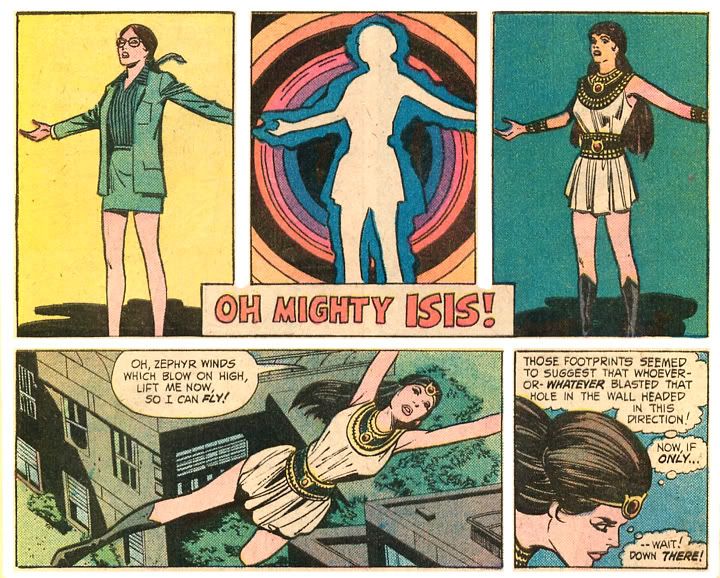 While they do give us a psweetly psychedelic Isis transformation, artists Mike Vosburg and Vince Colletta manage further the injury by whitewashing Dr. Barnes. Skeates strips him of his advanced degree and calls him mister instead of doctor, too. Why, it's almost as if no one working on this book had never seen a single episode of the show and merely relied on Shazam! #25 (Sept.-Oct. 1976) and Isis #1 (Oct.-Nov. 1976), and possible a couple of flippant remarks at an editorial meeting as their reference sources for all the characters. But that would be artistically irresponsible, right?
While they do give us a psweetly psychedelic Isis transformation, artists Mike Vosburg and Vince Colletta manage further the injury by whitewashing Dr. Barnes. Skeates strips him of his advanced degree and calls him mister instead of doctor, too. Why, it's almost as if no one working on this book had never seen a single episode of the show and merely relied on Shazam! #25 (Sept.-Oct. 1976) and Isis #1 (Oct.-Nov. 1976), and possible a couple of flippant remarks at an editorial meeting as their reference sources for all the characters. But that would be artistically irresponsible, right?
Hundreds of fans read this story, then tore their comics in disappointment and despair (ready to wait 20-odd years until the invention of the Internet and comic book blogging to vent their rage more fully), the remnants fluttering to the shag carpet like so many colorful autumn leaves—but wait! On a tattered shred from somewhere in the back of the comic. Could it be? Yes! It’s Cindy Lee! And what kind of trouble has she gotten herself into this time? Let's find out!
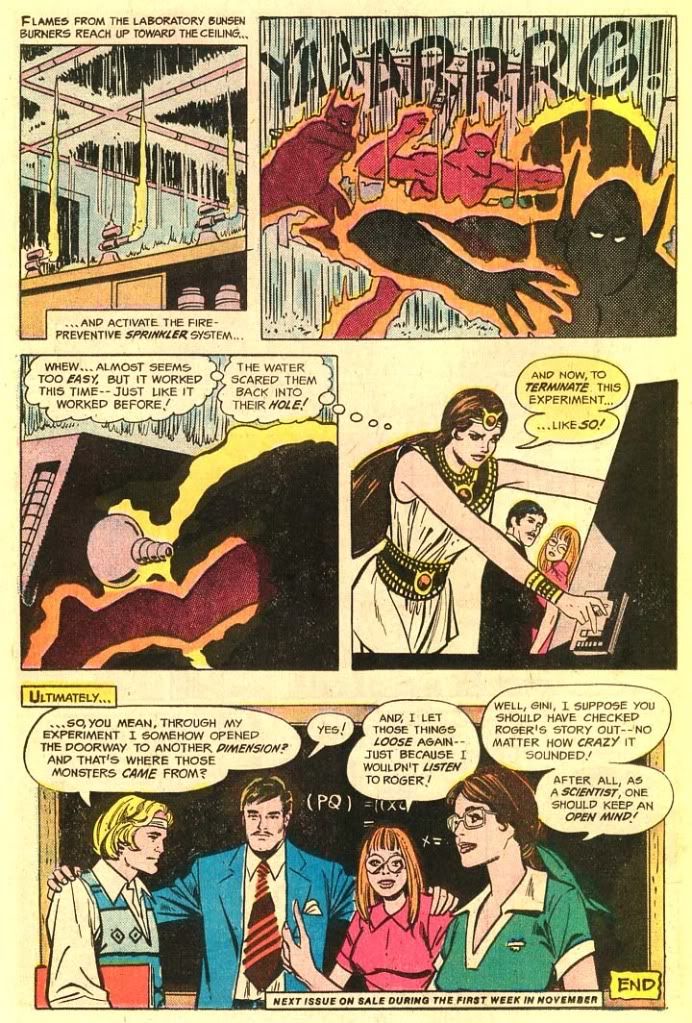 Where the main topic of conversation is none other than Cindy Lee herself. She's not there. It's almost a meta-commentary on the lead story. Thomas is surprised and immediately asks about her, because she of all people Cindy “likes
a party.” School, her teachers, pyramids, danger,
parties. These are the things Cindy Lee
loves so well.
Where the main topic of conversation is none other than Cindy Lee herself. She's not there. It's almost a meta-commentary on the lead story. Thomas is surprised and immediately asks about her, because she of all people Cindy “likes
a party.” School, her teachers, pyramids, danger,
parties. These are the things Cindy Lee
loves so well.
From what we now know of Cindy it's obvious would never miss a chance to hang out at school with her favorite teachers barring earthquake or death itself. In her DVD interview, actor Joanna Pang confirms at least some of my more rational Cindy Lee theories-- she's the kind of girl who always volunteers to stay after school, has her permission slips signed first and is unfailingly positive and go-getting. She's into anything and everything about school life, whether it's academics or just spending all day there soaking up the atmosphere and offering to help out wherever she can. So it's pretty believable people would remark on her absence from a school event.
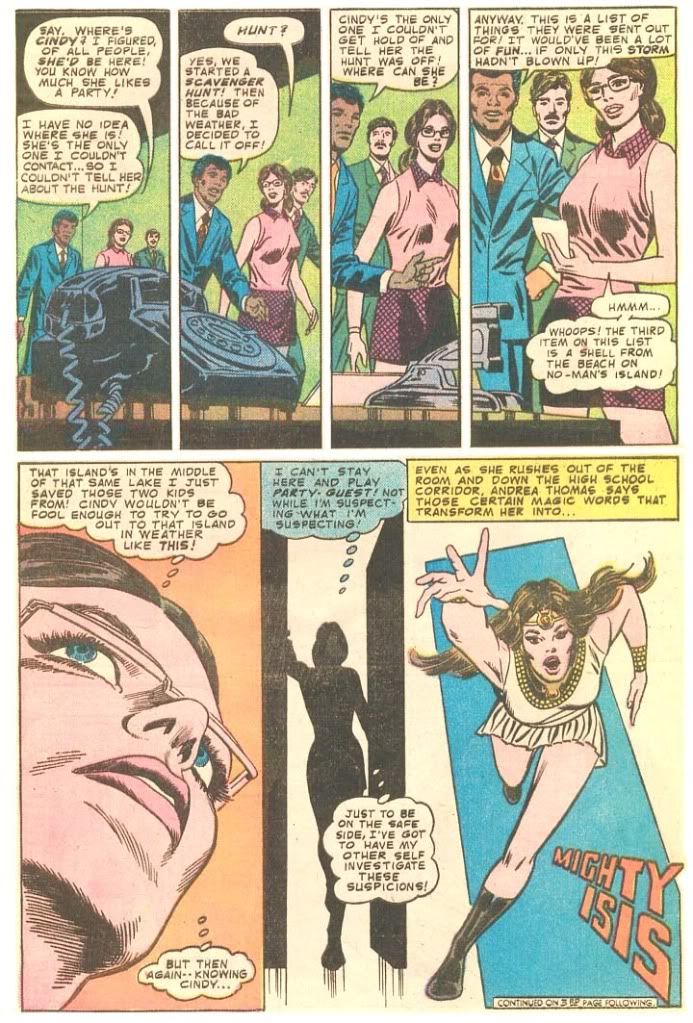 But what about everyone else? Another unrecognizable Mr. Barnes, apparently drunk to the point of hallucination (although he seems rational enough) insists he organized a scavenger hunt, then cancelled it due to the bad weather. But there's no sign of would-be scavenger hunters. Truth, alcohol-induced daydream or is Mr. Barnes just making this all up so Ms. Thomas won't think he and Rick Mason are pathetically hanging out by themselves?
But what about everyone else? Another unrecognizable Mr. Barnes, apparently drunk to the point of hallucination (although he seems rational enough) insists he organized a scavenger hunt, then cancelled it due to the bad weather. But there's no sign of would-be scavenger hunters. Truth, alcohol-induced daydream or is Mr. Barnes just making this all up so Ms. Thomas won't think he and Rick Mason are pathetically hanging out by themselves?
Maybe Skeates didn't specify a lavish attendance of students and faculty, but the very least art team Mike Nasser and Frank Giacoia could have done was infer from the dialogue more than three people in the room so Barnes doesn't look like either the saddest clown in the circus or a complete madman. We know the Filmation TV show was low-budget, but I'm pretty sure they had a few scenes with more than three people. After all, they created a fairly convincing school picnic for the "Bigfoot" episode. What was the budget DC allowed this comic for extras and supporting characters? Did Skeates and company blow it all on the science experiments in the lead story and have to skimp here?
We could ask Rick Mason, but he refuses to speak for most of this story.
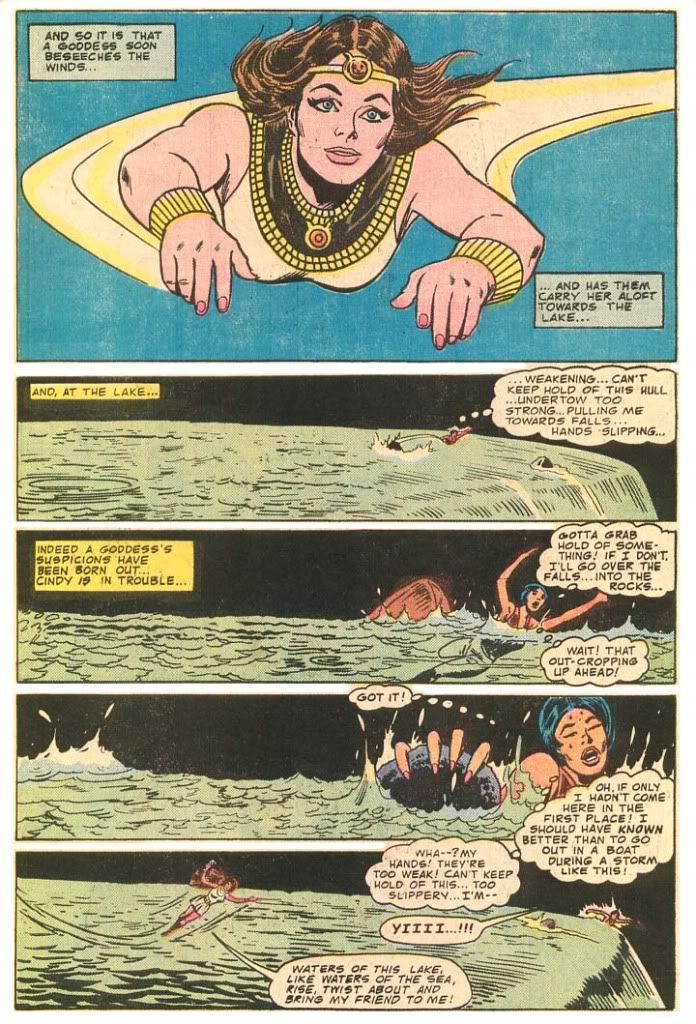 Mr. Barnes (he's a PhD on the TV show, by the way) must have convinced Cindy, at least, because the only explanation anyone can come up with for her absence is she's off trying to win the scavenger hunt. And yet they still expected to call her up and tell her the event was off. This is Cindy Lee in the era before cell phones. You send her on an errand, don't expect to ring her at home and find her there. If you even float the vaguest idea for a school activity, before you can say, "Nah, on second thought," she's organized the decorating and refreshments committees, nominated herself for vice-president of both, requisitioned petty cash from the school's general fund, bought five miles of colorful bunting and booked REO Speedwagon as the entertainment.
Mr. Barnes (he's a PhD on the TV show, by the way) must have convinced Cindy, at least, because the only explanation anyone can come up with for her absence is she's off trying to win the scavenger hunt. And yet they still expected to call her up and tell her the event was off. This is Cindy Lee in the era before cell phones. You send her on an errand, don't expect to ring her at home and find her there. If you even float the vaguest idea for a school activity, before you can say, "Nah, on second thought," she's organized the decorating and refreshments committees, nominated herself for vice-president of both, requisitioned petty cash from the school's general fund, bought five miles of colorful bunting and booked REO Speedwagon as the entertainment.
Of course you're not going to reach her, Mr. Barnes. She's Cindy Lee and you sent her looking for item number three, "a shell from the beach of No-Man's Island," you fool! Thank Isis you didn't think it would be funny to add "a golden apple from the Garden of the Hesperides" as item number two.
"Say, what's the rumpus?" they asked of DC, using then-current vernacular. "Give us the scoop, the low-down, the straight dope, and none of the high hat, ya palookas." DC's official answer: "Creative decision."
Writer Steve Skeates conjures up in her place a clever lad named Roger who uses Rick Mason's high school science equipment to create a pocket black hole that turns out to be a doorway into another dimension. Instead of earning himself a Nobel Prize for creating a limitless energy source from what's essentially an overgrown Erector set, Roger allows some kind of red monster to lurch out of it into our reality. Isis chases the destructive bugger back home, but Roger's friend Gini-- who looks a lot like Jan Smithers as Bailey Quarters from the early episodes WKRP in Cincinnati, by the way-- makes a special visit to the junior genius' hospital room so she can scoff at his wild monster story. Gini (who really should have been Cindy) vows to continue the experiment, this time with Mr. Mason supervising.
Nothing can possibly go wrong recreating the exact circumstances that unleashed a destructive creature on our world, right? Within minutes Isis has to contend with four of these monsters. John, Paul, George and It's Only Ringo. She defeats them simply by activating the school's sprinkler system, then turning off the machine. Gini admits her empiricism was a mistake, and Andrea Thomas tells her a scientist should always keep an open mind. And yet Cindy Lee isn't involved in the action in any way. She doesn't rush into a room to raise the alarm, doesn't bear witness to the wonders of science. She's not even menaced by the extra-dimensional creatures and doesn't get to help Isis deliver the moral. Instead, in an almost-criminal act of story self-sabotage, Skeates confines Cindy to two measly panels, with no dialogue. Name checked by Gini, some star-student-come-lately, then forgotten.
 While they do give us a psweetly psychedelic Isis transformation, artists Mike Vosburg and Vince Colletta manage further the injury by whitewashing Dr. Barnes. Skeates strips him of his advanced degree and calls him mister instead of doctor, too. Why, it's almost as if no one working on this book had never seen a single episode of the show and merely relied on Shazam! #25 (Sept.-Oct. 1976) and Isis #1 (Oct.-Nov. 1976), and possible a couple of flippant remarks at an editorial meeting as their reference sources for all the characters. But that would be artistically irresponsible, right?
While they do give us a psweetly psychedelic Isis transformation, artists Mike Vosburg and Vince Colletta manage further the injury by whitewashing Dr. Barnes. Skeates strips him of his advanced degree and calls him mister instead of doctor, too. Why, it's almost as if no one working on this book had never seen a single episode of the show and merely relied on Shazam! #25 (Sept.-Oct. 1976) and Isis #1 (Oct.-Nov. 1976), and possible a couple of flippant remarks at an editorial meeting as their reference sources for all the characters. But that would be artistically irresponsible, right?Hundreds of fans read this story, then tore their comics in disappointment and despair (ready to wait 20-odd years until the invention of the Internet and comic book blogging to vent their rage more fully), the remnants fluttering to the shag carpet like so many colorful autumn leaves—but wait! On a tattered shred from somewhere in the back of the comic. Could it be? Yes! It’s Cindy Lee! And what kind of trouble has she gotten herself into this time? Let's find out!
That torn panel is from "Lost and Found," the back-up story, which is much more Cindy-centric. It begins with bad weather and the heroic Isis doing that
thing she does so well: rescuing young people from danger. In this case, shes saves two teens who went boating
in the storm, only to capsize.
Isis lectures them, takes them home, changes back into
science teacher Andrea Thomas and heads to a swingin’ party…
 Where the main topic of conversation is none other than Cindy Lee herself. She's not there. It's almost a meta-commentary on the lead story. Thomas is surprised and immediately asks about her, because she of all people Cindy “likes
a party.” School, her teachers, pyramids, danger,
parties. These are the things Cindy Lee
loves so well.
Where the main topic of conversation is none other than Cindy Lee herself. She's not there. It's almost a meta-commentary on the lead story. Thomas is surprised and immediately asks about her, because she of all people Cindy “likes
a party.” School, her teachers, pyramids, danger,
parties. These are the things Cindy Lee
loves so well. From what we now know of Cindy it's obvious would never miss a chance to hang out at school with her favorite teachers barring earthquake or death itself. In her DVD interview, actor Joanna Pang confirms at least some of my more rational Cindy Lee theories-- she's the kind of girl who always volunteers to stay after school, has her permission slips signed first and is unfailingly positive and go-getting. She's into anything and everything about school life, whether it's academics or just spending all day there soaking up the atmosphere and offering to help out wherever she can. So it's pretty believable people would remark on her absence from a school event.
 But what about everyone else? Another unrecognizable Mr. Barnes, apparently drunk to the point of hallucination (although he seems rational enough) insists he organized a scavenger hunt, then cancelled it due to the bad weather. But there's no sign of would-be scavenger hunters. Truth, alcohol-induced daydream or is Mr. Barnes just making this all up so Ms. Thomas won't think he and Rick Mason are pathetically hanging out by themselves?
But what about everyone else? Another unrecognizable Mr. Barnes, apparently drunk to the point of hallucination (although he seems rational enough) insists he organized a scavenger hunt, then cancelled it due to the bad weather. But there's no sign of would-be scavenger hunters. Truth, alcohol-induced daydream or is Mr. Barnes just making this all up so Ms. Thomas won't think he and Rick Mason are pathetically hanging out by themselves? Maybe Skeates didn't specify a lavish attendance of students and faculty, but the very least art team Mike Nasser and Frank Giacoia could have done was infer from the dialogue more than three people in the room so Barnes doesn't look like either the saddest clown in the circus or a complete madman. We know the Filmation TV show was low-budget, but I'm pretty sure they had a few scenes with more than three people. After all, they created a fairly convincing school picnic for the "Bigfoot" episode. What was the budget DC allowed this comic for extras and supporting characters? Did Skeates and company blow it all on the science experiments in the lead story and have to skimp here?
We could ask Rick Mason, but he refuses to speak for most of this story.
 Mr. Barnes (he's a PhD on the TV show, by the way) must have convinced Cindy, at least, because the only explanation anyone can come up with for her absence is she's off trying to win the scavenger hunt. And yet they still expected to call her up and tell her the event was off. This is Cindy Lee in the era before cell phones. You send her on an errand, don't expect to ring her at home and find her there. If you even float the vaguest idea for a school activity, before you can say, "Nah, on second thought," she's organized the decorating and refreshments committees, nominated herself for vice-president of both, requisitioned petty cash from the school's general fund, bought five miles of colorful bunting and booked REO Speedwagon as the entertainment.
Mr. Barnes (he's a PhD on the TV show, by the way) must have convinced Cindy, at least, because the only explanation anyone can come up with for her absence is she's off trying to win the scavenger hunt. And yet they still expected to call her up and tell her the event was off. This is Cindy Lee in the era before cell phones. You send her on an errand, don't expect to ring her at home and find her there. If you even float the vaguest idea for a school activity, before you can say, "Nah, on second thought," she's organized the decorating and refreshments committees, nominated herself for vice-president of both, requisitioned petty cash from the school's general fund, bought five miles of colorful bunting and booked REO Speedwagon as the entertainment.Of course you're not going to reach her, Mr. Barnes. She's Cindy Lee and you sent her looking for item number three, "a shell from the beach of No-Man's Island," you fool! Thank Isis you didn't think it would be funny to add "a golden apple from the Garden of the Hesperides" as item number two.
Perhaps in an editorial meeting with Denny O'Neil, Skeates learned it's not an Isis story unless Cindy Lee finds herself facing death. No-Man's Island is on the same lake where those other kids nearly came to grief. Worried that her star pupil is even now intrepidly sailing to her doom, Ms. Thomas dashes out into the rain and transforms. Isis confirms her alter-ego's suspicions when she flies back over the storm-tossed lake only to find Cindy Lee clinging desperately to a tiny rock. Cindy is thinking to herself going boating alone in a gale might not have been the wisest of decisions, even had she possessed the nautical skills of Popeye himself.
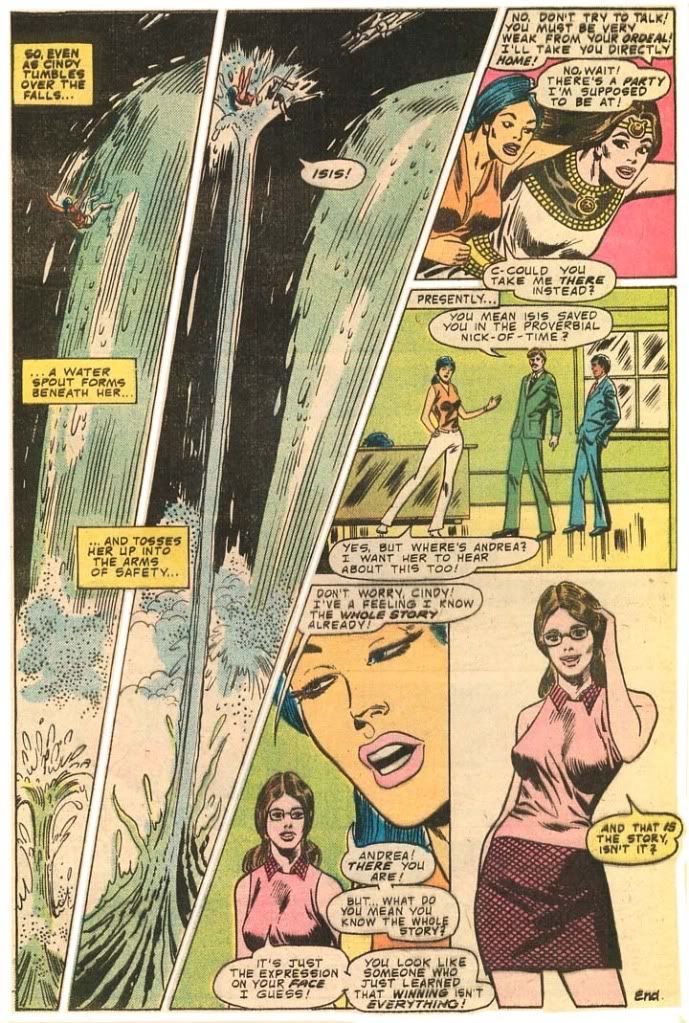 In terms of Cindy Dilemmas, where do we rank this? Somewhat worse than jumping a junkyard fence to spy on car thieves? Not as rash as using Rick Mason's car to chase coin thieves? On my patented Cindy Dilemma Scale, with one being the least dangerous and ten being the most, I give this an eight.
In terms of Cindy Dilemmas, where do we rank this? Somewhat worse than jumping a junkyard fence to spy on car thieves? Not as rash as using Rick Mason's car to chase coin thieves? On my patented Cindy Dilemma Scale, with one being the least dangerous and ten being the most, I give this an eight.
Over the waterfall she goes, our little daredevil, but Isis uses her Egyptian goddess magic to conjure up a life-saving waterspout. Anyone else would be traumatized, but all the resilient Cindy can think of is getting to that sparsely-attended party. What school spirit! What joie de vivre! Is there extra credit involved, or perhaps a letter of recommendation to go in her records?
 In terms of Cindy Dilemmas, where do we rank this? Somewhat worse than jumping a junkyard fence to spy on car thieves? Not as rash as using Rick Mason's car to chase coin thieves? On my patented Cindy Dilemma Scale, with one being the least dangerous and ten being the most, I give this an eight.
In terms of Cindy Dilemmas, where do we rank this? Somewhat worse than jumping a junkyard fence to spy on car thieves? Not as rash as using Rick Mason's car to chase coin thieves? On my patented Cindy Dilemma Scale, with one being the least dangerous and ten being the most, I give this an eight. Over the waterfall she goes, our little daredevil, but Isis uses her Egyptian goddess magic to conjure up a life-saving waterspout. Anyone else would be traumatized, but all the resilient Cindy can think of is getting to that sparsely-attended party. What school spirit! What joie de vivre! Is there extra credit involved, or perhaps a letter of recommendation to go in her records?
Once at the school and thoroughly dried-- although she's wearing the same outfit-- Cindy regales the party-goers (Rick Mason, Mr. Barnes and Andrea Thomas, again) with the hair-raising tale of her brush with death. Andrea Thomas makes a veiled allusion to being Isis, Cindy responds in confusion, Thomas somehow intuits Cindy's boating mishap had something to do with her desperation at winning the scavenger hunt which I'm still not convinced hasn't taken place solely within the confines of Mr. Barnes's mind.
Thursday, September 20, 2012
The Mystery of Cindy Lee
Okay, that video isn't all that helpful, and the "Personal information unknown" subtitles seem a little ominous. As far as I know, the always awesome Brian "Rick Mason" Cutler seems to be doing fine (I've been giving ol' Rick the business here on this blog, but it's the way DC's writers characterized him in the comic and doesn't reflect at all on Mr. Cutler or my warm feelings towards his role on the show), I haven't had time to look into Joanna Cameron. But what of that other Joanna? The one who played Cindy Lee? And why didn't Cindy appear in the truncated second season?
It's not much of a mystery, and it didn't take Isis and her magical goddess powers to solve it. Obviously, I'm on something of a The Secrets of Isis kick lately, having rediscovered this childhood favorite of mine. I was a huge fan of Filmation's live action shows and watched both Isis and Shazam! each week. I adored them uncritically. Low budgets and clunky special effects didn't matter to me, and I took to heart the simplistic yet valid moral messages.
But through all the years, my only solid memory of either of these shows was the minor personal trauma caused when Cindy Lee vanished from its second season. Rennie Carol? Who are you jokers trying to fool? Hey, I was eight years old and Cindy was my favorite character on the show. Not having her in the mix changed the character dynamics. It destroyed my sense of continuity.
That was my first experience with that kind of change. TV and comics can be harsh on young psyches. Networks abruptly cancel shows you love, actors quit due to contract disputes so producers write out their characters, comic book creators kill off others or turn them into villains, or the publishers re-boot their universes and consign any number of fan favorites or marginals to oblivion. Nothing against her replacement Ronalda Douglas, but I gave up on Isis when it became apparent Cindy wasn't simply absent from school due to the flu-- although given her personality, I doubt anything short of a coma would have kept her away from good ol' Larkspur High.
So, what happened to Cindy Lee? This was 1976, years before the Internet and fan blogging. If she'd appeared in Starlog magazine, I missed it. And I had no idea the DC comic book-- the letters page being a potential info source-- even existed. I probably could have written to Filmation or CBS and asked for an explanation, but the idea never occurred to me. By then I was busy with school, Halloween, Ark II and eventually Isis, Rick Mason and even Cindy Lee passed from my conscious into the scrapbook of my subconscious and I lost the tiny key to its little lock. Until this month. And I remembered. Cindy Lee! What the heck happened to Cindy Lee? Got herself into a jam but even this time Isis couldn't save her, huh?
Fortunately, Joanna Pang, the actor who so charmingly brought her to life in all her enthusiastic, perpetually cheerful glory, is very Cindy Lee-esque in real life. The Secrets of Isis complete series DVD contains a chatty, informative interview with her, and just like the character she once portrayed, she came prepared. She re-watched the old shows, found her diary from the time-- she apparently thought she was auditioning for Ices, a show about frozen Italian desserts-- shares production anecdotes and details her failed request of either Norm Prescott or Lou Scheimer to change Cindy's hairstyle from pigtails to something, anything, else. It's good stuff. But the heart of the matter comes towards the end when she good-naturedly addresses the issue of that second season.
After all this suspense, you're probably going to be disappointed to learn there's nothing sinister involved. She completed filming on the first season, returned to New York and waited for the call to start the second. It never came. She phoned her agent in California, who got in touch with Filmation and learned they'd decided to "go in a different direction." Pang says this is the reason you get when there isn't really a reason. And that was that. She moved on.
We moved on. Then, for the purposes of this dumb blog, I moved back to the old neighborhood. The old school is still there, only it's being used strictly for storage these days.
Labels:
70s TV,
Brian Cutler,
Cindy Lee,
Close Encounters,
fandom,
Filmation,
Isis,
Joanna Pang,
Rick Mason,
Star Wars,
Starlog,
vintage comics
Tuesday, September 18, 2012
Identifying with Batman and Spider-Man makes you feel good about yourself...
What do you think of this report? Apparently, some men who identify with Batman or Spider-Man feel better about their bodies when they look at pictures of their heroes, but if they're indifferent, the pictures make them feel worse. A previous study found a similar effect in women who viewed celebrity photos.
I love this stuff. I'm a psychology buff, and I know just enough about it to use its jargon to make bizarre, counter-factual claims and asinine pronouncements that can't withstand close scrutiny with facts. To me, this report actually raises more questions than provides answers. Here are a few.
1) What if you identify with Dani Moonstar or Cassandra Cain? What effect does looking at drawings of Spider-Man and Batman have on your self-confidence?
2) What if you identify with Buddy Bradley?
3) Or the Crypt-Keeper?
4) Have they done this study specifically with female comic book fans?
5) Would doing the above study produce similar results? Or, given the sexualized or fetishistic nature of how many female characters are presented, would they be opposite? I'd be very interested in seeing how this plays out, because while their numbers aren't as great as with male fans, female comic fans are incredibly passionate about their favorite characters.
6) What is the nature of identification with characters involving female comic book fans? Is it the same or different than with male fans?
7) What about fans with other gender identities?
8) Related to number one, how much cross-gender identification is there? Is this common, or isolated?
9) In the study of women and celebrities, what kind of photos were used? Were they candid shots, photos from public events or sexualized photo-spreads from men's magazines? And would any of those affect the results?
10) Is identification with characters-- in effect, the reader "masking" himself or herself with certain characters-- important to creating a fan base or readership?
BONUS 11) What about fans who identify with villains?
I'm seriously interested in someone doing a study on these, and some in-depth surveying of women who read superhero comics. Isn't it a fairly common belief male characters are idealized and more inviting of identification while female characters are objectified and more involving the reader in the male gazed based on an assumption that the readership is almost exclusively male? And yet women who are into superhero comics really latch onto these characters and they're extremely vocal with their opinions. Well, maybe that's just part of being a superhero comic fan. But you know... Stephanie Brown. Oracle. Huntress. Lois Lane. You dismiss or degrade these characters at your peril.
I'm also keenly interested in the gender dynamics. As someone who easily identifies with female characters-- I have my entire life and probably pretended to be Wonder Woman, the Bionic Woman or any one of Charlie's Angels and even Cindy Lee from The Secrets of Isis as often as I portrayed Superman, the Incredible Hulk, Sgt. Rock, Batman or Spider-Man as a child, and Dani Moonstar quickly became my masking character of choice in New Mutants-- and responds strongly to their positive and negative portrayals, I'm guessing I fall somewhere outside the control group or whatever the heck they used here. So I also want to know how other fans who view gender and sexuality in ways that aren't traditionally accepted.
And, strangely enough, I also identify quite a bit with characters with ambiguous morality-- in fictional, comic book dichotomous terms, not real life. I find we have to go outside the mainstream to find these kinds of richly drawn, troublesome characters. When I read Nexus, I tend to mask myself with Horatio Hellpop, but I find myself drawn to Ursula X.X. Imada whenever she appears on the scene. Outside of genre fiction, I find Hopey Glass and Terry Downe from Love and Rockets have always fascinated me more than Maggie, the star. And I have much more in common with Buddy Bradley from Peter Bagge's Hate than I'm comfortable admitting.
When I see drawings of them, how do I feel about myself? Pretty good, I guess.
I love this stuff. I'm a psychology buff, and I know just enough about it to use its jargon to make bizarre, counter-factual claims and asinine pronouncements that can't withstand close scrutiny with facts. To me, this report actually raises more questions than provides answers. Here are a few.
1) What if you identify with Dani Moonstar or Cassandra Cain? What effect does looking at drawings of Spider-Man and Batman have on your self-confidence?
2) What if you identify with Buddy Bradley?
3) Or the Crypt-Keeper?
4) Have they done this study specifically with female comic book fans?
5) Would doing the above study produce similar results? Or, given the sexualized or fetishistic nature of how many female characters are presented, would they be opposite? I'd be very interested in seeing how this plays out, because while their numbers aren't as great as with male fans, female comic fans are incredibly passionate about their favorite characters.
6) What is the nature of identification with characters involving female comic book fans? Is it the same or different than with male fans?
7) What about fans with other gender identities?
8) Related to number one, how much cross-gender identification is there? Is this common, or isolated?
9) In the study of women and celebrities, what kind of photos were used? Were they candid shots, photos from public events or sexualized photo-spreads from men's magazines? And would any of those affect the results?
10) Is identification with characters-- in effect, the reader "masking" himself or herself with certain characters-- important to creating a fan base or readership?
BONUS 11) What about fans who identify with villains?
I'm seriously interested in someone doing a study on these, and some in-depth surveying of women who read superhero comics. Isn't it a fairly common belief male characters are idealized and more inviting of identification while female characters are objectified and more involving the reader in the male gazed based on an assumption that the readership is almost exclusively male? And yet women who are into superhero comics really latch onto these characters and they're extremely vocal with their opinions. Well, maybe that's just part of being a superhero comic fan. But you know... Stephanie Brown. Oracle. Huntress. Lois Lane. You dismiss or degrade these characters at your peril.
I'm also keenly interested in the gender dynamics. As someone who easily identifies with female characters-- I have my entire life and probably pretended to be Wonder Woman, the Bionic Woman or any one of Charlie's Angels and even Cindy Lee from The Secrets of Isis as often as I portrayed Superman, the Incredible Hulk, Sgt. Rock, Batman or Spider-Man as a child, and Dani Moonstar quickly became my masking character of choice in New Mutants-- and responds strongly to their positive and negative portrayals, I'm guessing I fall somewhere outside the control group or whatever the heck they used here. So I also want to know how other fans who view gender and sexuality in ways that aren't traditionally accepted.
And, strangely enough, I also identify quite a bit with characters with ambiguous morality-- in fictional, comic book dichotomous terms, not real life. I find we have to go outside the mainstream to find these kinds of richly drawn, troublesome characters. When I read Nexus, I tend to mask myself with Horatio Hellpop, but I find myself drawn to Ursula X.X. Imada whenever she appears on the scene. Outside of genre fiction, I find Hopey Glass and Terry Downe from Love and Rockets have always fascinated me more than Maggie, the star. And I have much more in common with Buddy Bradley from Peter Bagge's Hate than I'm comfortable admitting.
When I see drawings of them, how do I feel about myself? Pretty good, I guess.
Labels:
Batgirl,
Batman,
Cassandra Cain,
Cindy Lee,
Dani Moonstar,
fandom,
Hopey Glass,
Nexus,
psychology,
questions,
Spider-Man,
Superman,
Wonder Woman
Monday, September 17, 2012
"...And All Through the House:" Joan Collins visits the Cryptkeeper for a merry li'l Christmas murder
You know what's fun? Practically anything to do with EC Comics. Beautifully drawn morality tales with twist endings, black humor and oozing with loads of gore-- EC Comics are pure joy for twisted kids of any age. This company and its books were the stuff of legends when I was a child. Comics so freaky and scary the government itself had to step in and shut them down. I just assumed they were all destroyed or collected and locked away in some case-hardened, nuclear bomb-proof silo in the desert Southwest, a site guarded by unmarried, family-less soldiers near retirement age, a place forever cursed and haunted. Actually, they mutated into Creepy and Eerie, then migrated across the Atlantic where British Amicus Productions adapted five classics for the 1972 anthology fear-ture (heehee!) Tales from the Crypt.
My first experience with this movie came at the library an easy bike ride from my house. The reference section contained these massive volumes on horror movies with photos from flicks like Freaks and London at Midnight. One of them presented Tales complete with a brief run-down of its origins in those infamous old horror comics and a huge picture of some poor jerk about to make his painful way down a corridor lined with razor blades. This must have been in the late 1970s, the beginning of my lifelong interest in and love for EC.
Strangely, the segment I like best among the stories that make the movie's cut (heh heh heh) comes not from any issue of Tales but from Vault of Horror #35 (February-March, 1954). You know, Vault was the Vault-Keeper's hang-out, and boy was he pissed at that glory-hogging Crypt-Keeper. Not only does the Crypt-Keeper have the honor of being portrayed by BAFTA-winning, Academy Award- and Tony-nominated Shakespearean actor Sir Ralph Richardson (the Old Witch would have picked Arnold Stang), while the Vault-Keeper only managed to appear on the Saturday-morning cartoon Tales from the Cryptkeeper... but Crypty also gets to tell Vaulty's prized story. The Vault-Keeper doesn't even have an origin, just a ratty hooded cloak. Which Sir Ralph steals for this movie, rather than wear a wig to match the Crypt-Keeper's flowing locks.
Yes, you guessed it. It's "...And All Through the House." None other than Johnny Craig wrote and illustrated the comic story. Craig was a sharp plotter-- check out the stories he wrote and drew for Warren a decade later-- and a genius at creating cinematic suspense in two-dimensions, a four-color Hitchcock. Each panel in this short, fast-paced tale is a masterpiece of lighting effects and rising tension before its inexorable ironic finale.
The movie adaptation follows the story note-for-note if not visual-for-visual. As such, it's virtually a one-woman show starring Joan Collins in kind of role she was seemingly born to play-- a cold-hearted murderer. She brains her husband with an iron poker on Christmas Eve, just after he's put her gift under the tree and settled in to read the newspaper and listen to some seasonal music on the radio. He goes down on the rug spilling blood and brains, his eyes bulging grotesquely and his tongue sticking out. Collins is wearing a party hat is a touch of the morbid humor that ran through each and every EC horror title.
Why does she do kill him? Well, to collect on is assurance policy (that's insurance to you and me, Russ), but it's probably not that important. What matters is, it sets up the onrushing situation. Because it's just her bad luck Collins chooses the one Christmas where an escaped madman in a stolen Santa Claus outfit is part of the the holiday festivities (by order of the town council).
And he's right outside the house! Out of all the houses he could have picked, he's drawn to the one where the future star of a movie delightfully titled The Bitch and hate-queen of the TV show Dynasty has offed her spouse! How very coincidental! How convenient! How lucky for us! Now Joan has to dispose of a body and secure the homestead against an unwelcome holiday guest. The poor woman goes through hell, only to have her innocent daughter let the seasonally-costumed killer right inside where he...
Well, it's an EC story. They don't get giddy on eggnog then kiss under the mistletoe, I assure you. When he finally appears, the Santa killer is more dopey than deranged, kind of like an alcoholic bell-ringer in need of a shower instead of a maniacal menace. A visual disappointment.
Director Freddie Francis, a horror veteran who would later provide cinematography for David Lynch and Martin Scorsese, camera-stalks poor Collins... all through the house (boo hoo hoo). She makes the most of her screen time. From her satisfied reaction to having committed murder-- with a sneering inflection to her post-poker "Merry Christmas," Collins coolly conveys this in such a way you believe it's been building for a while-- to her growing hysteria as she shutters the windows and locks the doors and tries to figure out what to do about her husband's carcass, it's a performance of perfect pitch. She makes you loathe yet feel strangely sympathetic to this woman when essentially you're watching a scenario that pits a calculating murderer against one of those old school nutzoids. He can't help himself. What's her excuse? No matter; Francis and Collins have done their work well.
So well, in fact, Robert Zemeckis directed another adaptation of this story for an early episode of the TV show, rubbing salt in the Vault-Keeper's wounds by once again letting the Crypt-Keeper-- rather than an august theatrical personage, now a desiccated, nose-less creature with John Kassir's high-pitched voice and memorably maniacal cackle-- introduce one of his best. Zemeckis tapped Larry Drake (TV's adorable Benny from L.A. Law) to play the killer. Not the woman; the Santa guy. Drake puts his hulking, naturally sinister looks to good use, aided and abetted by some effective make-up. He more closely resembles the Craig's crazy, too, than the dirty old bum from the movie version.
To compare the two a bit, the movie is largely sincere while the HBO series plays the material more for outright laughs, a bit of cheese if you please. This is a fine approach, one just as close in spirit to EC as Francis's more sober take. EC didn't rely on comedic relief simply so readers could breathe between shocks. It's all over the comics, from the sometimes startlingly gruesome covers to the letters pages to the house ads, all part of the same gleeful embrace of horror for horror's sake. A dance held in a drafty tomb, a moonlit frolic among the headstones. The TV series turns this up a notch for a more jaded audience, but the movie still has a smidge of camp, some cheeky little moments. Mainly, though, it busts its celluloid buns to gross people out and scare them into wetting their undies along with the winking and the smirking.
You know, I don't think the Vault-Keeper has ever gotten over this betrayal. If you should find yourself in a cemetery some cloudy, moonless night, and he beckons you into his vault for a story-telling session, I advise you not to mention "...And All Through the House." Or if you do, certainly don't let him know I told you all this.
Later we're going to take a look at Craig's original and drool over it like deranged Santa Claus.
 |
| The sign you're in for some real fun. |
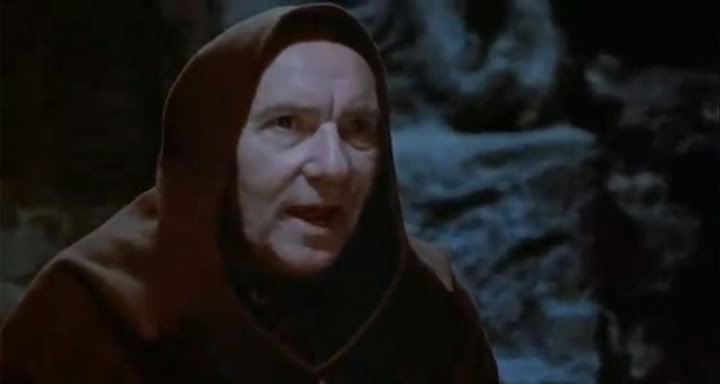 |
| "Dare you enter the Crypt-Keeper's Crypt?" |
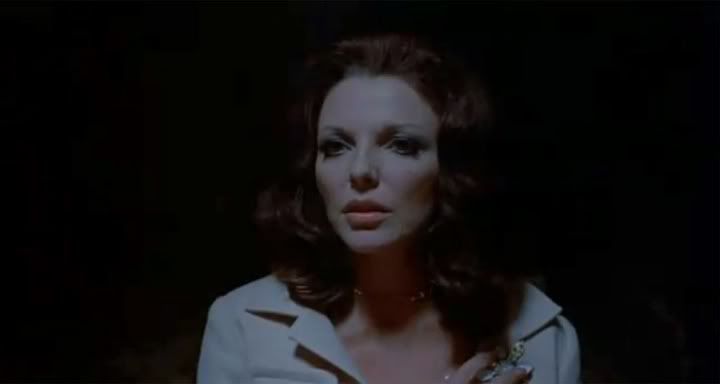 |
| "The fu-- ?!" |
The movie adaptation follows the story note-for-note if not visual-for-visual. As such, it's virtually a one-woman show starring Joan Collins in kind of role she was seemingly born to play-- a cold-hearted murderer. She brains her husband with an iron poker on Christmas Eve, just after he's put her gift under the tree and settled in to read the newspaper and listen to some seasonal music on the radio. He goes down on the rug spilling blood and brains, his eyes bulging grotesquely and his tongue sticking out. Collins is wearing a party hat is a touch of the morbid humor that ran through each and every EC horror title.
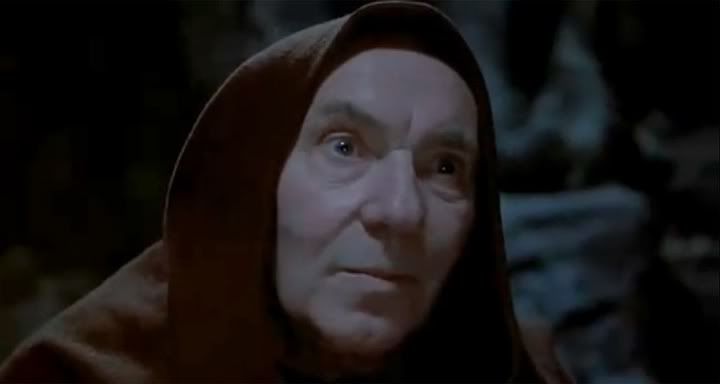 |
| "Hmmm?" |
And he's right outside the house! Out of all the houses he could have picked, he's drawn to the one where the future star of a movie delightfully titled The Bitch and hate-queen of the TV show Dynasty has offed her spouse! How very coincidental! How convenient! How lucky for us! Now Joan has to dispose of a body and secure the homestead against an unwelcome holiday guest. The poor woman goes through hell, only to have her innocent daughter let the seasonally-costumed killer right inside where he...
 |
| "And down I go..." |
Director Freddie Francis, a horror veteran who would later provide cinematography for David Lynch and Martin Scorsese, camera-stalks poor Collins... all through the house (boo hoo hoo). She makes the most of her screen time. From her satisfied reaction to having committed murder-- with a sneering inflection to her post-poker "Merry Christmas," Collins coolly conveys this in such a way you believe it's been building for a while-- to her growing hysteria as she shutters the windows and locks the doors and tries to figure out what to do about her husband's carcass, it's a performance of perfect pitch. She makes you loathe yet feel strangely sympathetic to this woman when essentially you're watching a scenario that pits a calculating murderer against one of those old school nutzoids. He can't help himself. What's her excuse? No matter; Francis and Collins have done their work well.
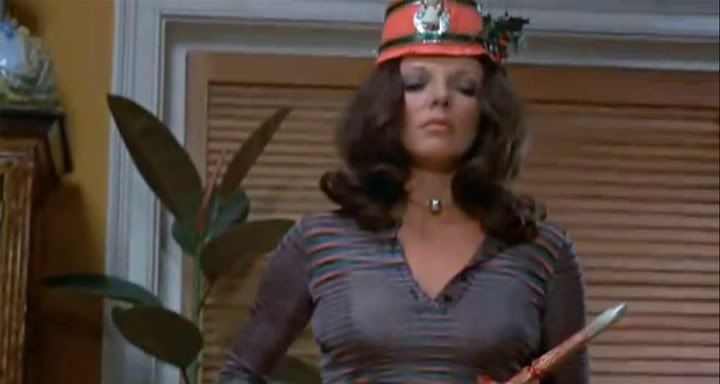 |
| "Merry Christmas..." |
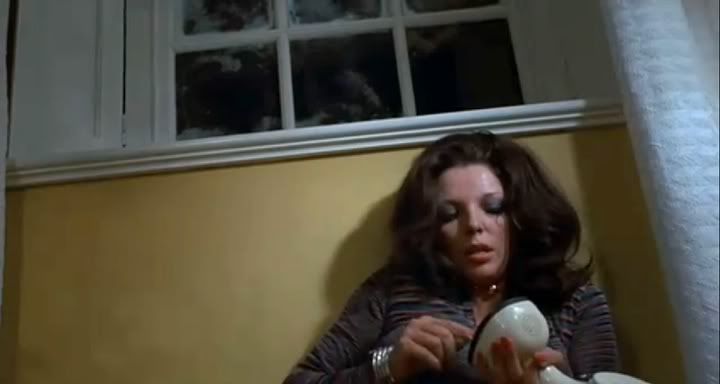 |
| "Blast! Speed dial won't be invented for years!" |
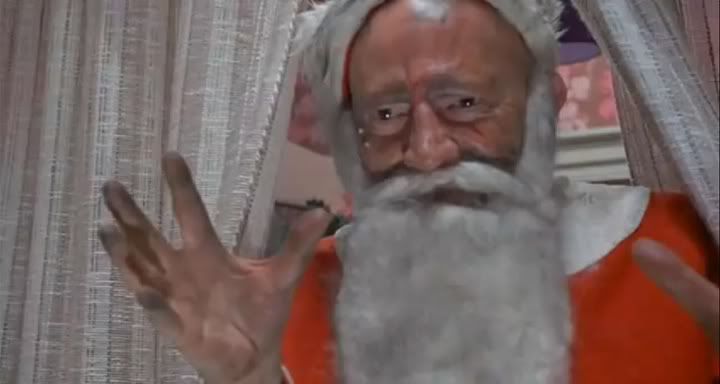 |
| "Grandpa! You're Santa?" |
Later we're going to take a look at Craig's original and drool over it like deranged Santa Claus.
Subscribe to:
Comments (Atom)

